
Become a Saint Join the Rainbow Cult
Queer Love and Alternative Therapy: A Look at MDMA & Ketamine



Become a Saint Join the Rainbow Cult
Queer Love and Alternative Therapy: A Look at MDMA & Ketamine


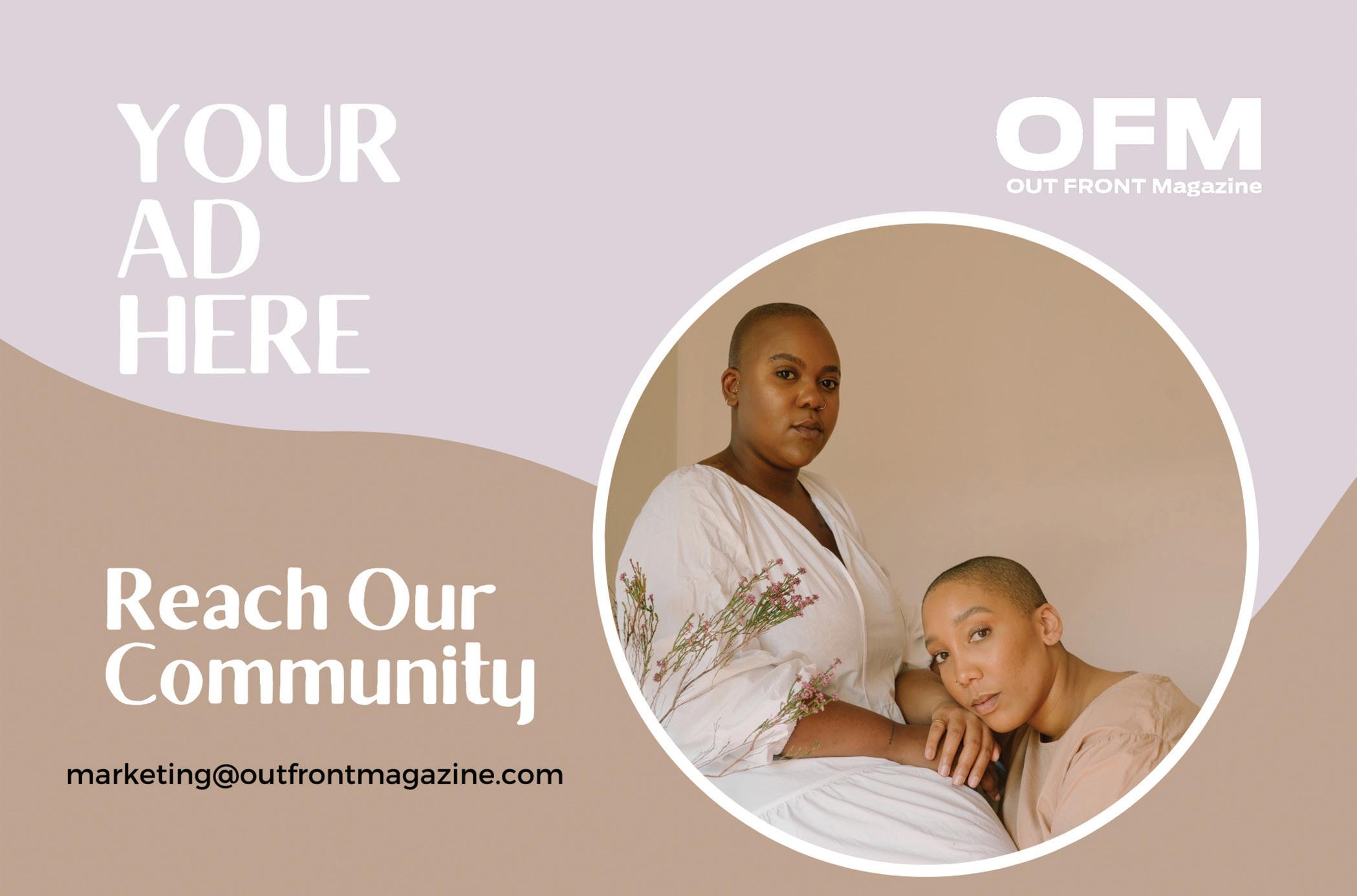
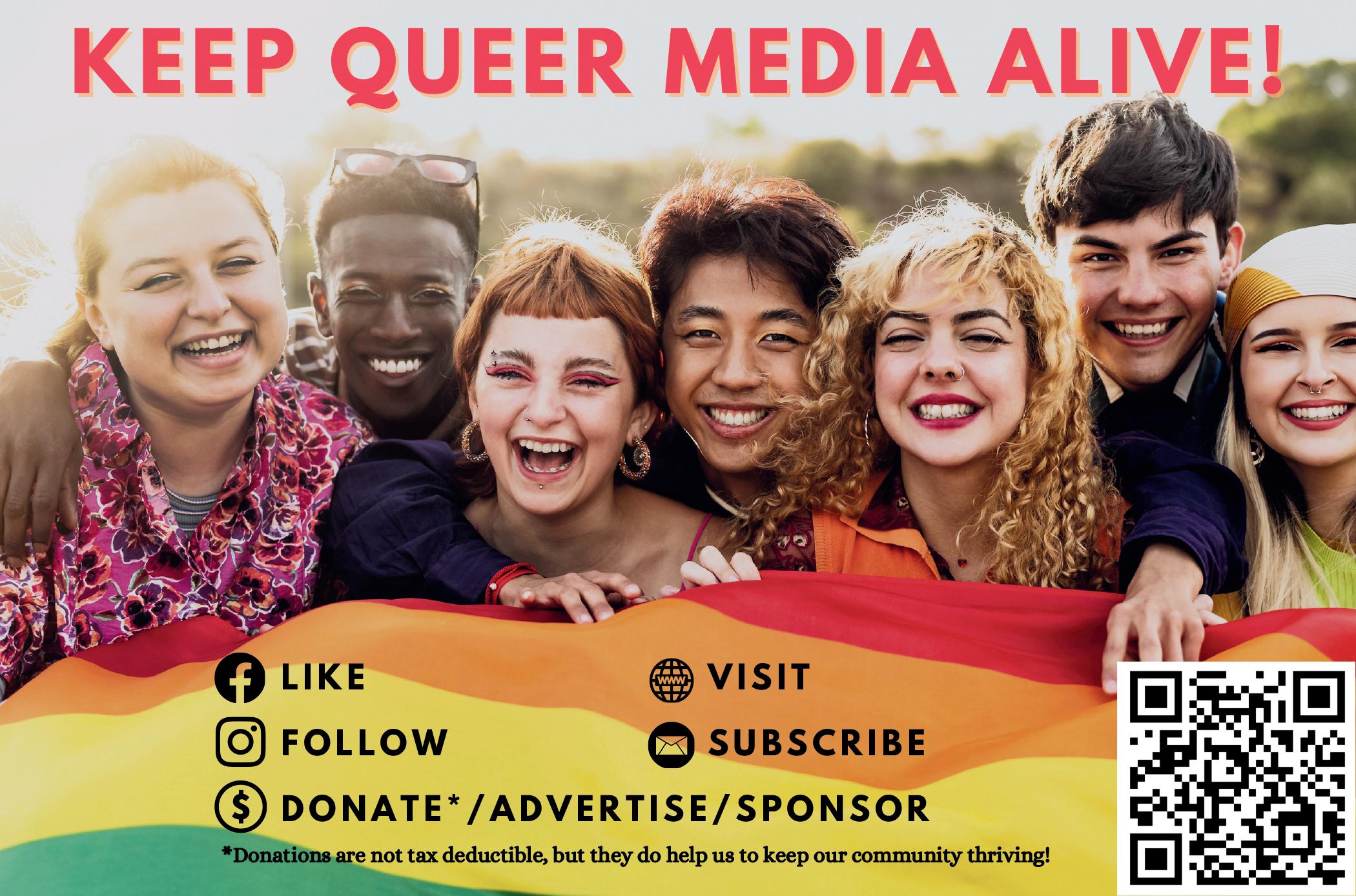
by Tyi Reddick
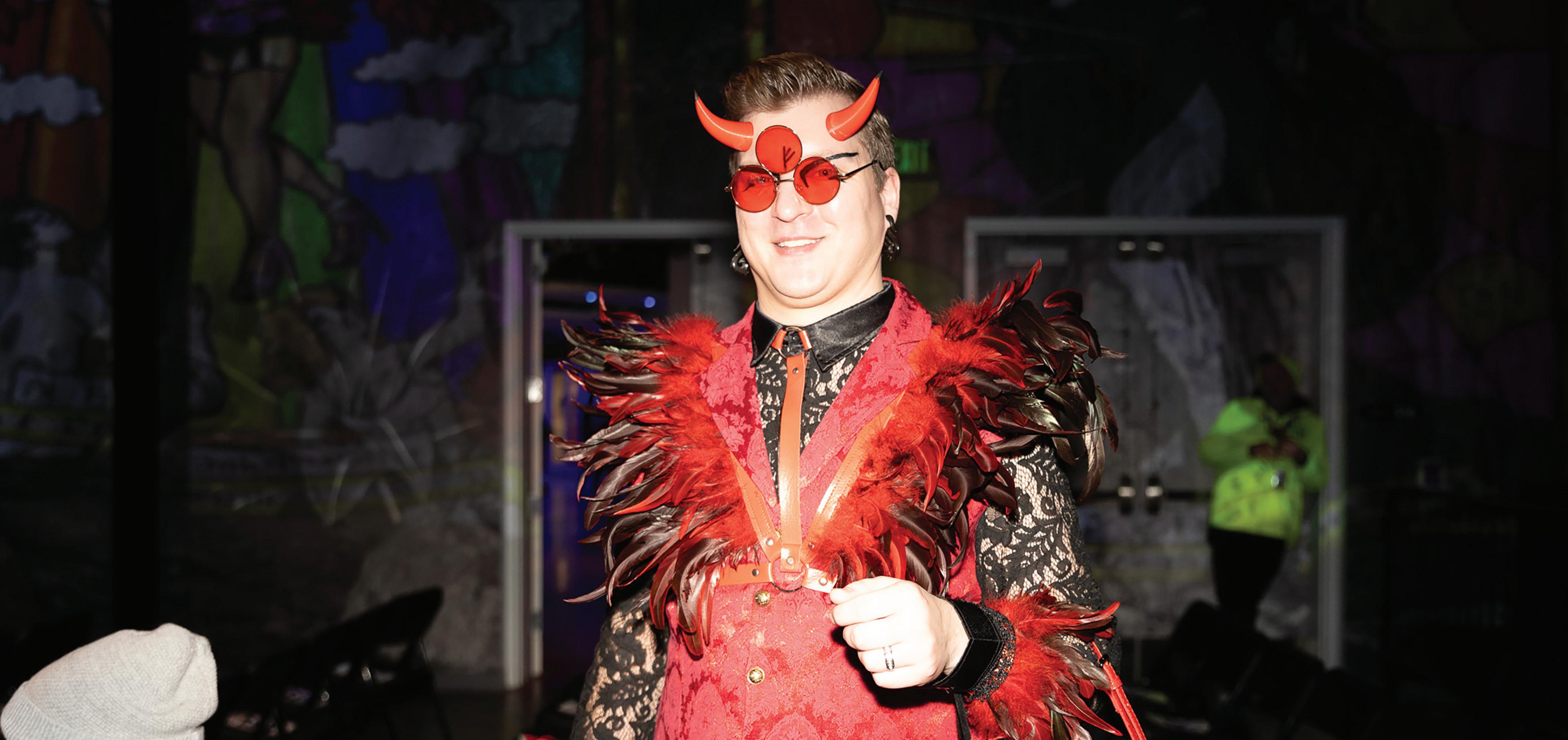

SERVING THE LGBTQ COMMUNITY OF THE
ROCKY MOUNTAINS SINCE 1976
PHONE 303-477-4000
WEB /OUTFRONTMAGAZINE.COM
FACEBOOK /OUTFRONTCOLORADO INSTAGRAM /OUTFRONTMAGAZINE
FOUNDER
PHIL PRICE 1954-1993
ADMINISTRATION
INFO@OUTFRONTMAGAZINE.COM
CO-PUBLISHER MAGGIE PHILLIPS
CO-PUBLISHER ADDISON HERRON-WHEELER
CHIEF STRATEGIST LANI LANGTON
EDITORIAL
EDITORIAL@OUTFRONTMAGAZINE.COM
EDITOR-IN-CHIEF ADDISON HERRON-WHEELER
ASSOCIATE EDITORS ANNA LEE AND HARRY LEVIN
INTERNS ANNA GUNDERSON, ANNA LEE, ASTROPHEL CHAPMAN, CLARA GAUTHIER, CLAUDE GROSSI, EDEN HEFFRON-HANSON, HAILEE STEGALL, HARLEY ROSE, LEXI
HOLTZER, MADELEINE FARBER, MICAH THOMAS, ODALIS BARROSO, OMAR MEDINA, OSCAR LEON, RHETT KAYA, SHAE VOLZ, TEAGUE MCDANIEL, VOID GRAVES, ZANDRA DOWNS, ZORA BELGARIAN
ART ART@OUTFRONTMAGAZINE.COM
DESIGNER IVY OWENS
COVER IMAGE JULIAN VANKIM
COVER MODEL ANDY SCAHILL
PHOTOGRAPHERS JULIAN VANKIM AND TYI REDDICK
SOCIAL MEDIA MANAGER MICAH HOWELL
WORD SEARCH KERRY SHATZER MARKETING +
FOR
THE CLAIMS OF ADVERTISERS AND RESERVES THE RIGHT TO REJECT ANY ADVERTISING. PUBLICATION OF THE NAME OR PHOTOGRAPH OF ANY PERSON OR ORGANIZATION IN ARTICLES OR ADVERTISING IS NOT TO BE CON-
SIDERED AN
5 5 4 6 7 15 8 17 18 19 21 21 30
September 01-31 picks /6
Violet Chachki Oriental Theatre
Colorado’s Drag Royale
Tracks
Second Star on the Left
Meow Wolf
Illusions: Drag Queen Dinner Show
Glow Lounge
Comedy Queens
RISE Comedy Club
Love’s Labour’s Lost
Town Hall Collaborative
Bar Wars
Tracks
Mitski and Ethel Cain
Red Rocks Amphitheatre
OFM Presents: Psychadelic Dreams Meow Wolf
OFM DSW Queer Networking
Catalyst Paramount Theatre
Bob The Drag Queen
Sobo Dance Fest
RiNo Art Park
Spirit of The Beehive
Meow Wolf

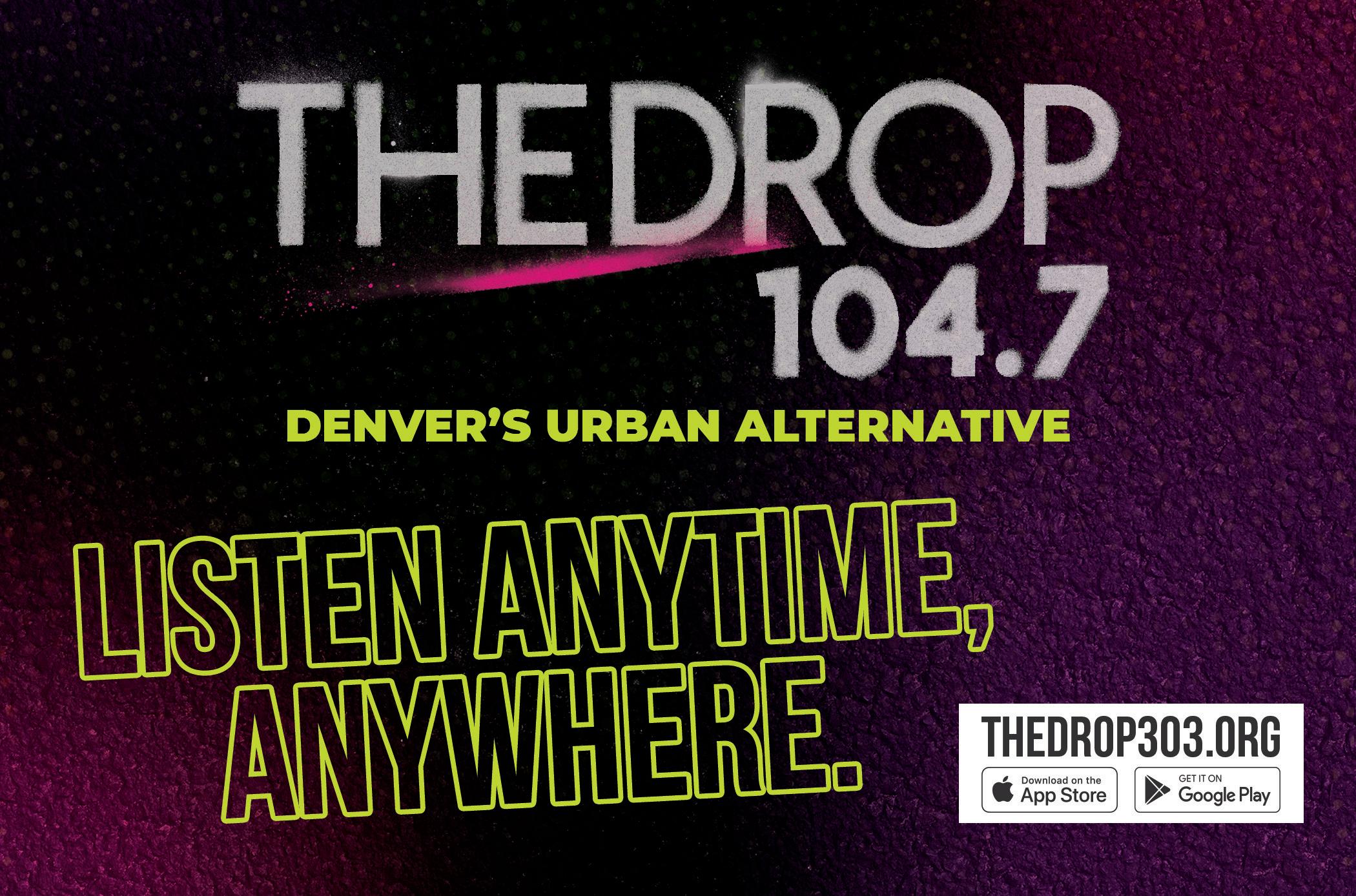
You’re holding in your hand the making of history: For the first time in our 48-year legacy, OFM is doing psychedelics! Well, an issue, that is...
Yes, we’ve done a drugs issue before, and we always do the cannabis issue in April. But now we bring you something new: a psychedelics issue every September, in honor of 9/20, the holiday for psilocybin.
Why a psychedelics issue?
We believe that decriminalizing mushrooms in Denver is going to have a similar impact on the community as cannabis legalization. And we also believe that functional mushrooms, psilocybin, MDMA therapy, and other substances that used to be demonized are going to transform the worlds of recreation and health for queer folks.
So, expect some mushy love from us every fall, along with some celebrations to boot. In addition to the informative content on our website this month and in the issue, we are stoked to throw our Psychedelic Dreams party at Meow Wolf later this month during their Adultiverse celebration on September 18 and let the 9/20 fun roll (safely,
legally, and consensually of course!)
If you have thoughts on the emerging mushrooms market, tips for OFM on what to cover, or if you just want to connect, please drop us a line. This is us tipping our proverbial mushroom caps to you, good sirs and madams, gays and theys. Let the festivities begin!
-Addison Herron-Wheeler

by Odalis Canchola


Hmic universe? Imagine a place where you can indulge your senses into a celestial realm far from the compressed reality to which our minds can become so accustomed.
Whether you are looking for a new adventure, new astro knowledge, a spontaneous date idea, or you’re searching for interactive ways to educate students on our universe, Fiske Planetarium invites you to dive into their immersive space, located on the beautiful mountain-surrounded campus of University of Colorado, Boulder (CU Boulder).
Fiske Planetarium opened in 1975 with a generous donation from Wallace Franz Fiske, CU Boulder class of 1917. Since then, the planetarium has maintained its commitment to space exploration while also embracing new advancements such
This year, Fiske is celebrating 49 years of engaging success by serving communities that value innovative, immersive, and inclusive experiences. If you have a strong interest in anything related to the cosmos, astronomy, music, art, and film, you can gravitate towards all of them at Fiske.
On Thursdays through Sundays, there are a variety of captivating shows to watch, including laser shows for music from artists like Bille Eilish, Harry Styles, and Pink Floyd. In the dome, the boundaries between imagination and reality blur, and the immensity of the universe feels within reach as the projection of bright stars lights up your eyes, all possible thanks to the talented team of staff and 30-plus undergrad student employees.
When you walk into the Fiske building, you step into the presence of pure creativity, astronomy consciousness, and
you can find abundant knowledge, unique art installations, a science projector on display, and spacesuits that have been donated by NASA, making CU Boulder the only public university that receives funding from NASA. So far, 20 astronauts have graduated from the university.
I had the pleasure of speaking with two impactful and friendly women who work at Fiske, Carla Johnson (she/her), membership, marketing, and digital strategy manager of eight years, and Sarita Narayanswamy, social media specialist and graphic designer (she/her) of three years, who also curates the music shows. They both shared their experience working there, emphasizing the focus on community, as well as their profound perception of astronomy and what connecting with the universe means to them.
“THE LEARNING THAT COMES FROM HERE IS SO GENUINE.”
- CARLA JOHNSON

“What drew me to astronomy is that it's so humbling and grounding. You can be having a crap day, and when you realize everything it took to be here on this planet, to be alive, to have a conscious brain and to look out at the stars and see what millennia of people have seen … ” Carla says. “We’re still seeing the same stars and developing new stories and ideas about what the sky is telling us. It is very humbling and reassuring, and I feel very grounded as a human when I am thinking and sharing about astronomy.”
What would you say makes Fiske so interesting and unique compared to other planetariums?
Johnson: I think there's something here for everybody. Whether or not you're a hardcore star person, we are going to amaze you. If you want to come and see a visualization of a black hole, we can show you that. If you're interested in science, we can show you that. If you want to come here on a Friday night and chill out and watch lasers and listen to music, we have that space too. We offer so much. It’s a variety everyone can be a part of!
Would you say Fiske inspires you, and if it does, how so?
Johnson: I love being community help for the Denver and Boulder area to share science and music. I think there’s something here for everybody.

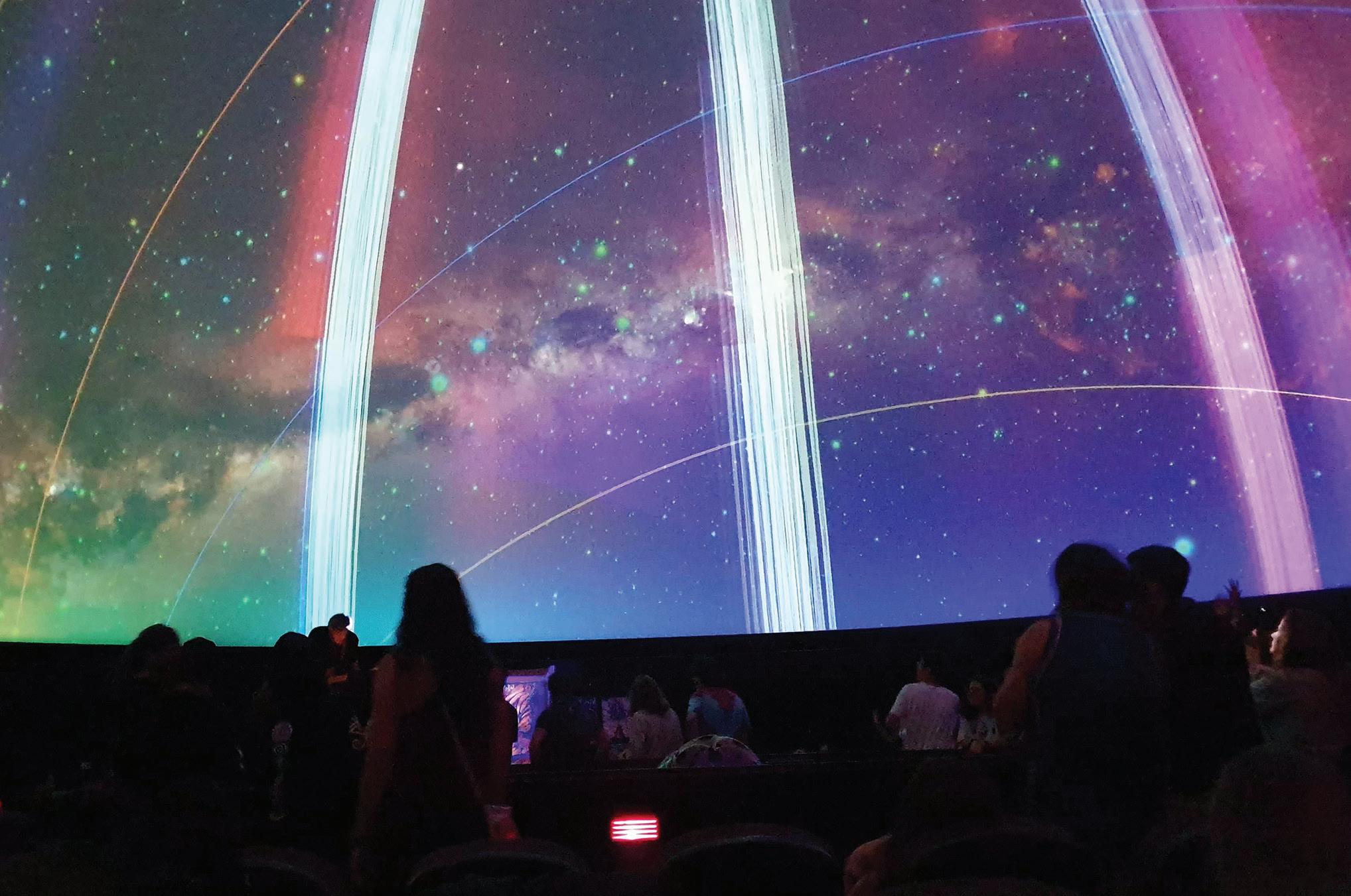
Narayanswamy: I’ve worked here since college and just graduated CU (college of) the arts. I studied music, and being here was such a nice way to diversify my interests and focus. All the intersectionality between science and the arts is very inspiring. The shows we have are geared towards audiences of any age. Our new show coming in fall that’s called One Sky is such a great representation of astronomy in different cultures. It really spoke to me because it's so inclusive. Getting to know their stories is so inspiring and educational in such an engaging way.
When is the best time to come visit, and what can visitors expect?
Johnson: We have public shows on Thursday, Friday, and Saturday nights and matinees on Saturday and Sunday afternoons. We offer a
diverse range of fulldome films, star talks, live talks, laser liquid sky music shows, concerts, and theatrical productions.
What is the most rewarding aspect of being part of such a creative and immersive environment?
Johnson: Providing a space and programming for anyone with an open, curious mind. People can come to Fiske and have fun while learning something new and unexpected.
What are visitors' reactions or thoughts after their first visit here?
Johnson: When these families come in, the first thing you hear are the little ones screaming,”Wow!” And hearing those voices echo down the hallway is what we are doing this for. That little one is going to remember that moment. Even with adults, you always see the sparkle in their eyes.
How does Fiske impact students and the community?
Johnson: This space helps you keep an open mind. Whenever I was having a hard day at school, being here at Fiske helped me calm my mind, and also I feel so unified with everyone. It's definitely very community-oriented and welcoming.
Narayanswamy: We are a classroom, fieldtrip destination, fun datenight experience, space for families to relax, and out-of-town visitors to explore. The programs we produce offer enriching experiences that are informative, engaging, and entertaining.
When did your interest in astronomy begin?
Johnson: When I was little, I was
super interested in planets, but girls are not that encouraged to study science, math, and technology in the education system at that time. So, I ended up in a career in human resources.
Later, in my mid-20s, I looked through a telescope at the Denver Science Museum, and I just lost my mind. That changed my entire career. Ever since then, I've been very passionate about using all of my human resources, campaigns, and communication skills to communicate science and astronomy.
What are some accomplishments the Fiske team would like to share with its community?
Johnson: Recovering from the pandemic was challenging, but we have had over 50,000 people visit. When schools can’t come here, we are able to go to them. We have an inflatable planetarium that we take to schools. We have even gone up to the west-
ern slope in Colorado just to make sure the kids have access to science.
What goes on behind the scenes to produce the shows and short films?
Johnson: It is a very detailed process, but one we enjoy because we get to share our films across the world for free. It involves script development, conceptualization/explanation of difficult concepts, animation, and more, all interwoven by compelling storytelling. We are proud to be able to leverage the prolific and talented academic community to create captivating, entertaining, and scientifically accurate shows. We believe that our collective institutional knowledge and scientific research should be shared with the global community for free. Over the last decade, we've produced 20 fulldome films. As of 2023, there are 750plus planetariums in 70 countries and 48 states.
How does Fiske provide affirming support to everyone?
Johnson: We lift the voices of people from different backgrounds and partner with community organizations to represent stories, knowledge, and languages from different cultures.
What are recent updates at Fiske others would love to hear about?
Johnson: We have three new films coming this fall that we’re super excited to share: one is called Destination on Mars, the other is One Sky, stories from indigenous constellations, and one for little kids called Hazelnut in Search for the Perfect Planet. So we are really excited to bring new films.
Narayanswamy: We just put in a new laser system for the music shows, and these are just next level. It's like a club! We have a fog machine, a great sound system and now the new lasers. It's a great vibe if you love music, definitely come check it out.
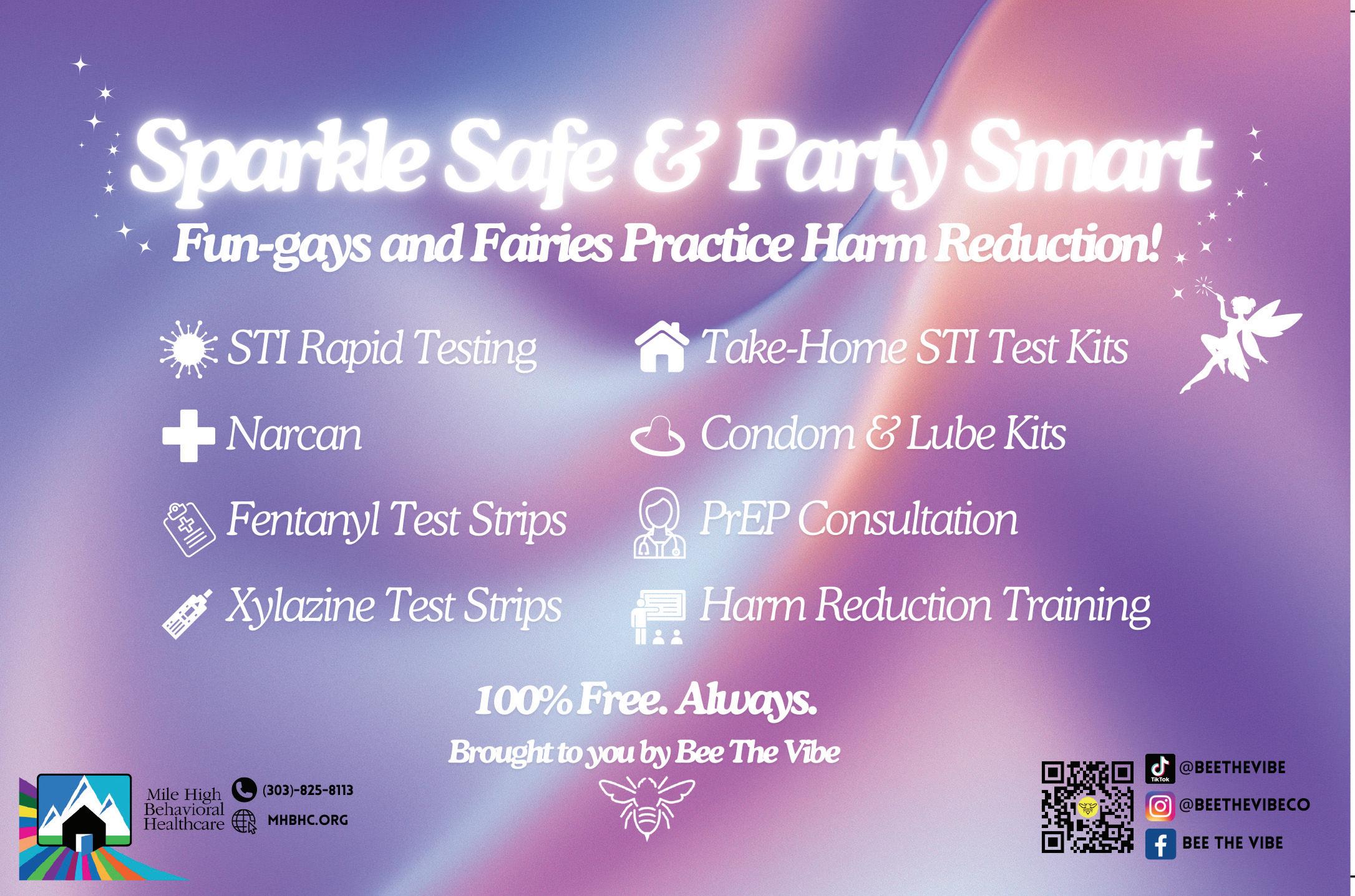

by Harley Rose

As Coloradoans anticipate the rollout of psilocybin legalization in 2025 following the passage of the Natural Health Medicine Act, researchers from Naropa Center for Psychedelic Studies explain what people can expect from Colorado on both the clinical and legal fronts.
Dr. Diana Quinn, director of clinical education, and Joe Harrison, executive director, discuss the future of healing centers in Colorado and describe the outlook of future psychedelic research as it pertains to the treatment of mental health conditions.
What is 'natural medicine'?
Dr. Quinn: The Natural Medicine Health Act is designed to encompass a number of different plant medicines, as well as fungi and cacti that would all be hallucinogenic or induce non-ordinary states of consciousness. The initial piece of the legislation of the NMHA is focused on psilocybin specifically, wherein—and this is our area of focus—psilocybin services can be offered and received within certain kinds of defined or prescribed context.
Also, the NMHA decriminalizes broadly plant medicines across the board. There may in future be the possibility
of inclusion of additional forms of plant medicine within similar contexts as what psilocybin is being used right now. But at present, really the framework is around psilocybin facilitation, so that individuals who wish to have an experience with psilocybin would seek and establish care with a facilitator.
What will facilitation look like?
Dr. Quinn: "There are two tiers of facilitation. One tier is the clinical facilitation tier, which would be applicable to someone who already holds a license with [the Department of Regulatory Affairs (DORA)] to provide any type of clinical care, whether it's psychotherapy or medical care.
They would be allowed to practice within their scope under their pre-existing secondary license with DORA, as well as do psilocybin facilitation and see clients who are coming for a range of reasons, specifically for therapeutic purposes, whereas the other general facilitation tier is available for adults who wish to become licensed as psilocybin facilitators who do not already carry a secondary license with DORA.
So, it's meant to be a general adult use program so that individuals who are seeking psilocybin services don't need to see somebody specifically with a medical or therapeutic background. They can just see someone who wishes to be trained and do facilitation that doesn't strictly have to have that background. It's a novel profession, essentially, or trade.
Joe Harrison: I just want to clarify, even though the regulations are being built, they're not completely finished, and that access to psilocybin won't be offered until 2025, when Colorado is going to allow these licensed businesses, which they're calling healing centers, to begin delivering that service line. So, it's still kind of in this period of
unfolding. The Department of Regulatory Affairs has finalized its draft rules. We're waiting on others. And it's not totally clear exactly how all of the pieces are going to be put together. But the hope is that we will begin being able to offer psilocybin therapeutically in 2025 in the state of Colorado.
What do these regulations look like as they're unfolding?
Harrison: The NMHA also makes a provision for training centers or training programs. One of the things that Naropa is heavily involved in is training individuals to be psychedelic practitioners or practitioners within the space. These are the individuals who will be working within the healing centers themselves.
In addition to rules around training programs and healing centers, there are also rules around cultivators of psilocybin. That's how the product actually is grown and gets to these healing centers.There are these different pieces that all have to be put together. I think a lot of folks are looking to Colorado to see how it's going to roll out, so it's important that we get this right because they'll be looking at what we did well and what didn't go so well.
What differences exist between rollouts in Colorado versus Oregon?
Dr. Quinn: A different body has overseen the training and licensing of facilitators, which are the rules that

currently have been published and signed. So one of the key differences that is already in place between Colorado and Oregon is, as I was mentioning, the different tiers of facilitation.
In Oregon, there's only one tier and one type of facilitation. Therefore,someone who has a clinical license to practice may not use their scope of practice while they're doing psilocybin facilitation. That has been one area of complaint and critique that has come up among some of the facilitators in Oregon. Another concern that has been broadly expressed in Oregon that we're waiting to see play out in Colorado are the rules and regulations governing the healing centers themselves and what the fees will be.
What can you tell us about accessibility as it pertains to facilitation of these treatments?

Dr. Quinn: Accessibility isn't just about the cost. It's also ensuring that the practitioners are diverse and able to service a number of communities. This year alone, we have given out about $240,000 in training scholarships to trainees within Naropa Center for Psychedelic Studies. About a third of those trainees are people of the global majority. Thirty percent identify as Two-Spirit LGBTQ. I think that it's what makes our program successful.
I identify as a queer person of color myself. The majority of our teaching team are queer, trans, and Black and brown clinicians and practitioners in both of our programs: our Certificate of Psychedelic Assisted Therapy, as well as the psilocybin facilitator training.
So representation in the training, in the teaching team, and affinity spaces, as well as opportunities for not only creating more inclusivity for folks who often don't experience a high level of welcome or inclusion in a lot of teaching environments or conventional spaces, and particularly, the psychedelic space, is not across the board inclusive all the time.
How much does treatment cost?
Harrison: "The average cost (in Oregon) is $2,500. There are ways that we can reduce those costs mechanically and there are other ways like through creating access funds, that we can support people who might not otherwise be able to afford it.
What are some misconceptions when it comes to this kind of treatment?
Dr. Quinn: One misconception is that psychedelic therapy could be sort of a cure-all or a panacea of just good benefit for everyone and everyone should try it. That's definitely not the case.
Certainly, the research is promising. There are hundreds, if not thousands of years of empirical evidence for these medicines having context in indigenous lineages. Those contexts are very different from the kind of frameworks that we're talking about here in a healing center or in a clinical or medical context.
So, I think that there are some ways in which putting these ancient wisdom traditions and these medicines into these contexts—which are very human and therefore very flawed—could actually not always be of benefit to all. Not to mention the impact to those indigenous lineage carriers and the sometimes extractive way of thinking that can come with the capitalist systems that we're operating inside of.
Sometimes people have a very rosy concept of what the psychedelic field is. For any number of reasons, psychedelic medicine may not be suitable for everyone and doing facilitation work is not a really glamorous thing.
It's actually really difficult to maintain a high level of presence and compassion and feel very secure in a situation that can be rather volatile and unpredictable. These are non-specific amplifiers. The medicines can really generate a lot and for some people they can get worse before they get better.
For facilitators who maybe don't have their own very solid foundation or a community of practice, it can be disconcerting. Sometimes people who are drawn to

go into the work might not really understand the gravity of what they're holding as a responsibility. So those are just a few things that come to mind.
Harrison: I would add that the same excitement and energy that drives enrollment in our programs also is part of this larger bubble of excitement around psychedelics. I've heard leaders in the field say things like this could be critical to the survival of our species. This overblows expectations, and we're starting to see some of the repercussions of that kind of thinking.
These expectations that psychedelics are going to solve all of our human problems—We're going to have to reckon with that, with the reality that it's not a panacea. With programs and legislation coming online in Colorado and in Oregon, we're going to see what the actual healing implications are for psychedelics as they go out into the real-world.
It'll also be really interesting to see if MDMA is approved by the Food and Drug Administration. If psilocybin is approved federally, as these medicines roll out, as these therapies roll out, we'll collect more realworld data.
Can you speak to the effectiveness of this treatment?
Harrison: "Psychedelics—psilocybin specifically— have been shown to be effective, or rather there's data to support its effectiveness in a number of indications, including depression. There have been studies done with psilocybin, where, at least in the initial studies, they saw something like an 80% quit rate (for smoking), which is double what you would see with standard care.
So, I think that if we can roll it out right, and if we can make this accessible, it will help address a crushing mental health crisis in the U.S. I'm not saying it's going to solve it. We do have to get it right, right? We have to make sure that it's accessible to the people who need it. But I think that there's a lot of potential in this field to do really good work and to provide a lot of healing.
Dr. Quinn: What came to mind was the clinical research that showed psilocybin plus therapy to be more than twice as effective as any existing combination drug plus therapy that's available now, and something like four times more effective than therapy alone.
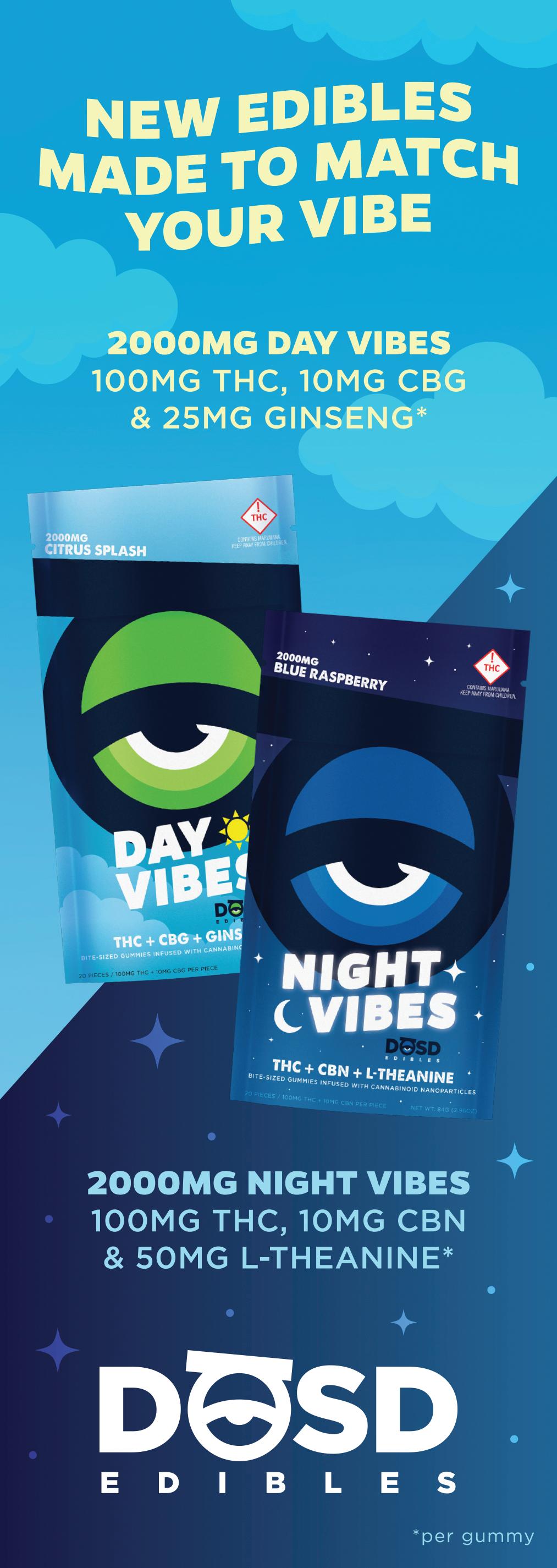
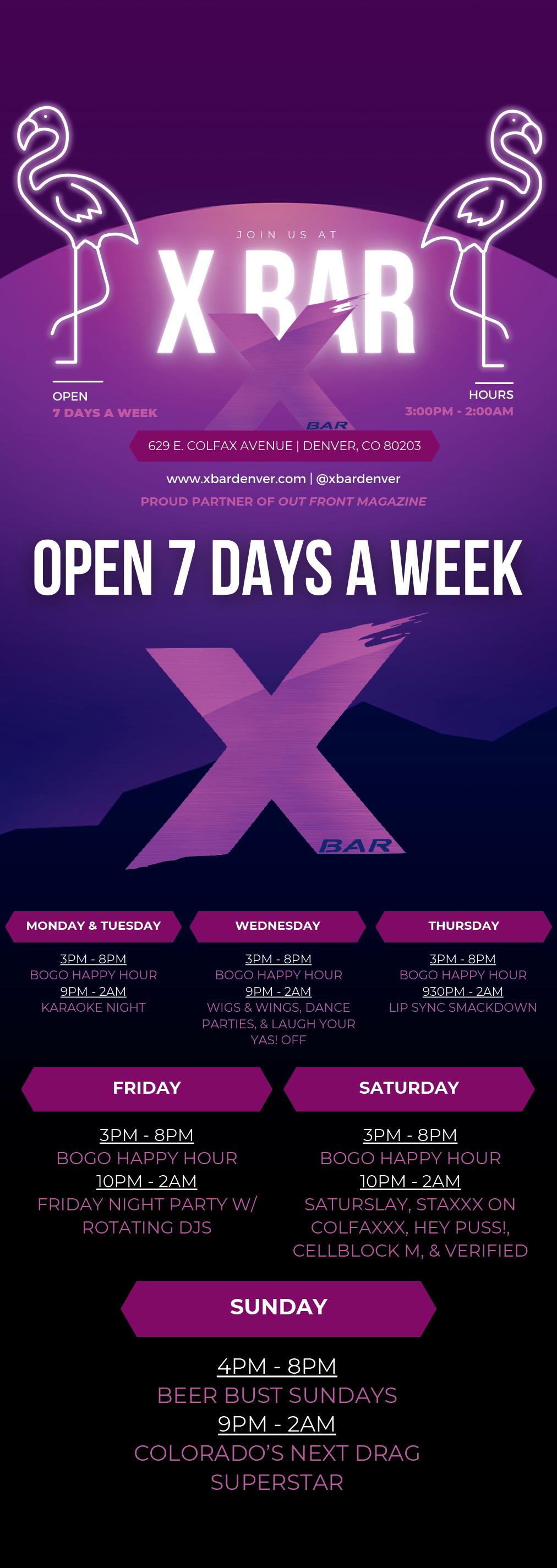
by Tyi Reddick
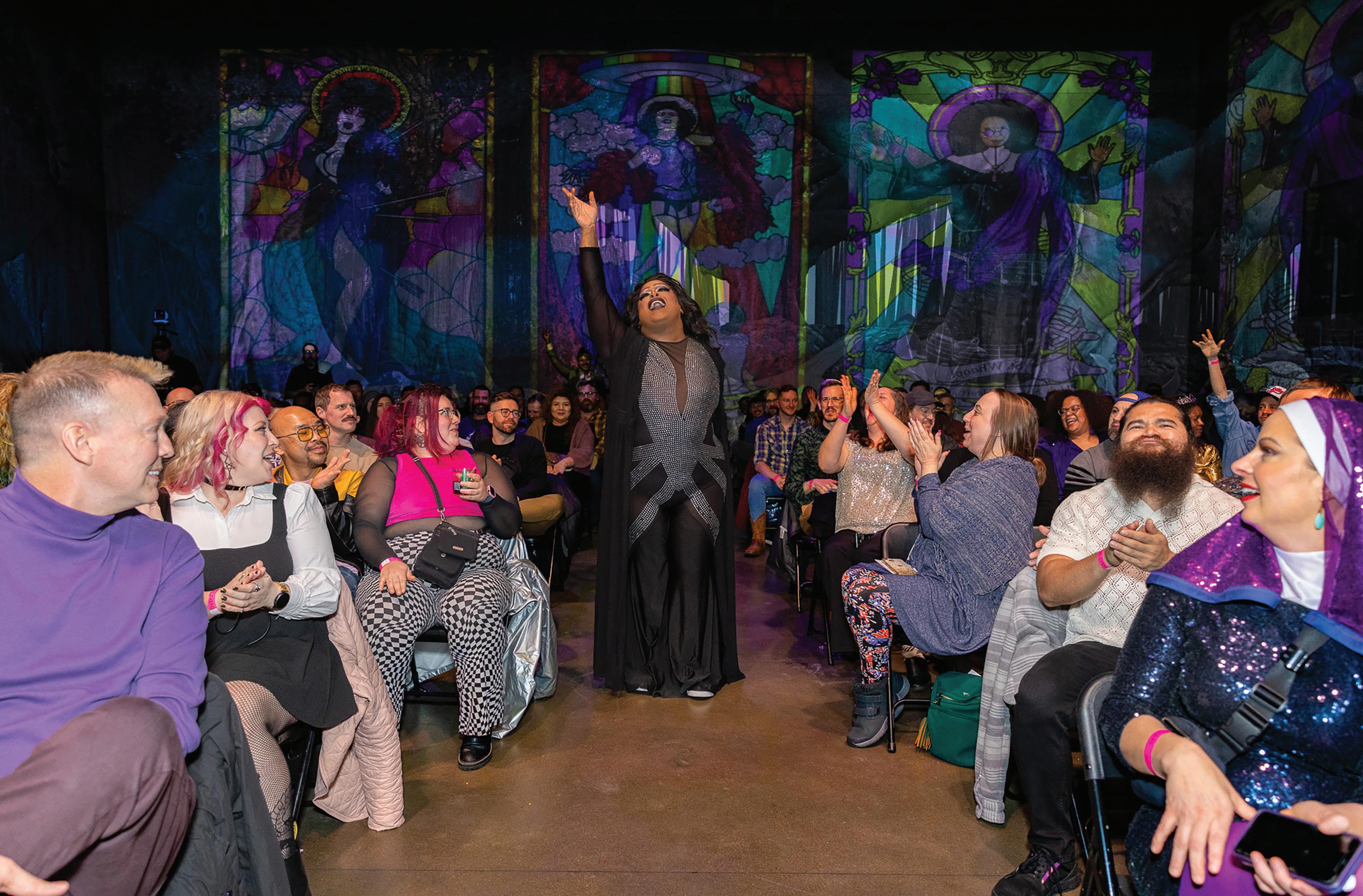

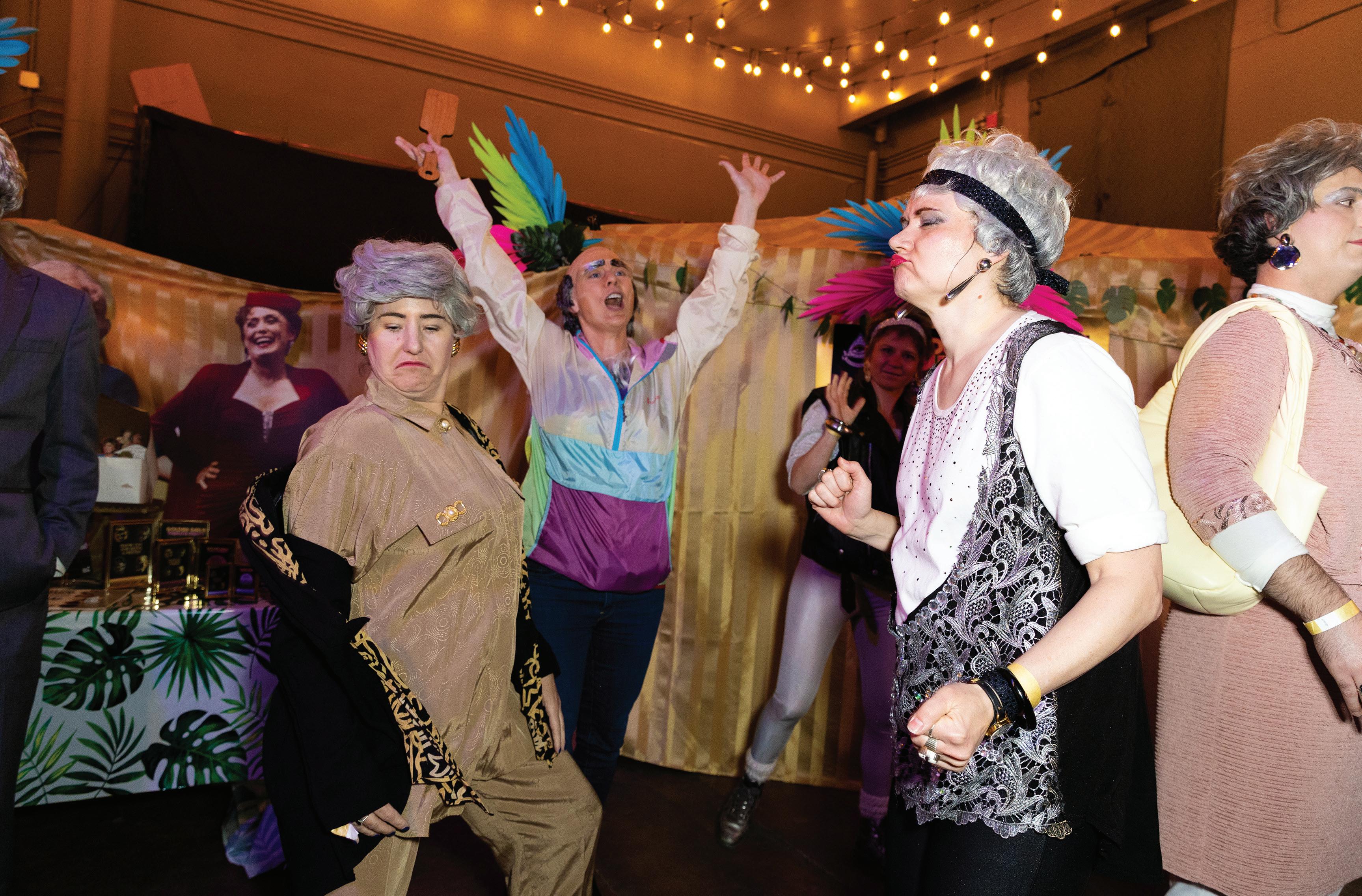
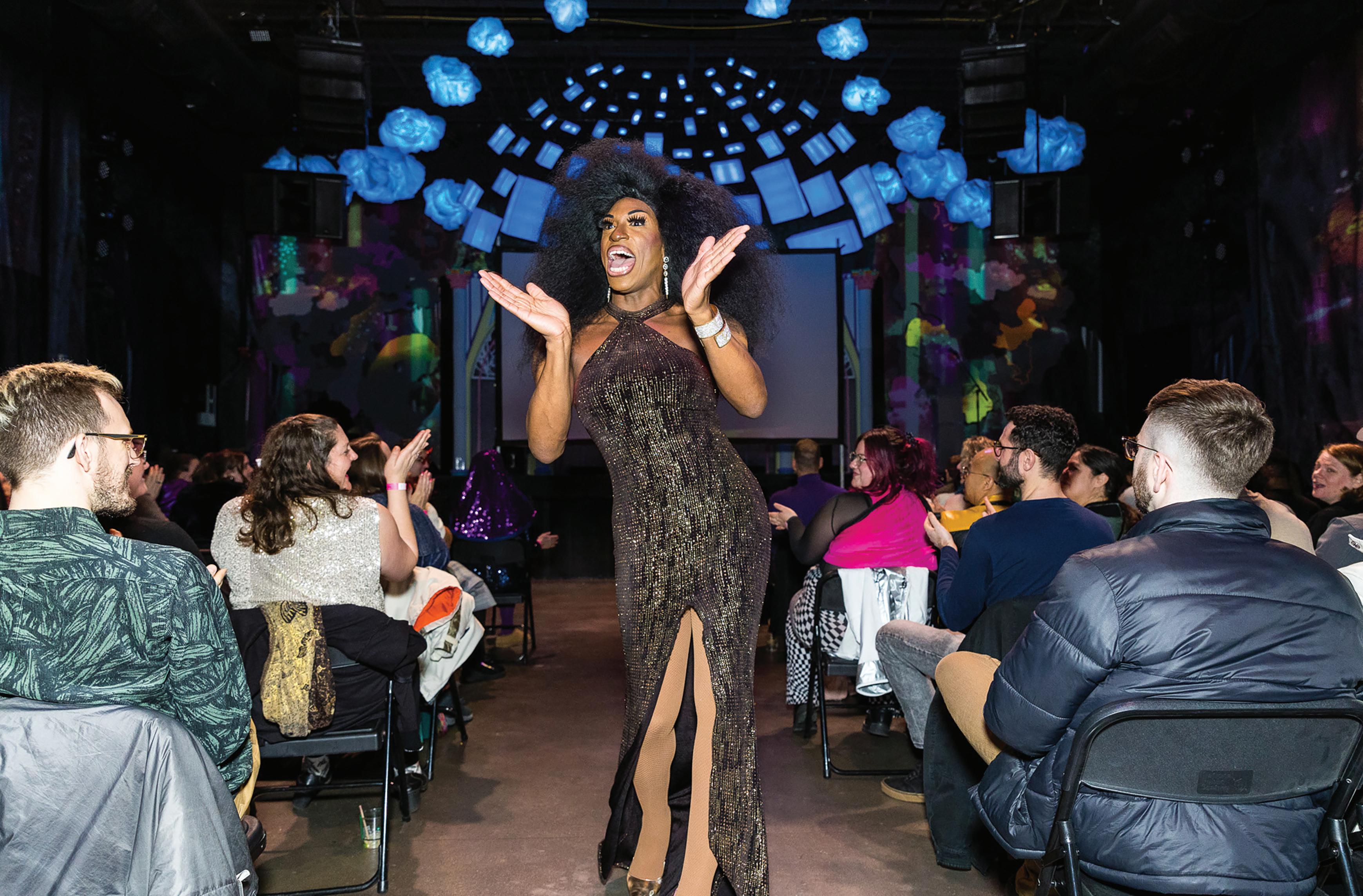

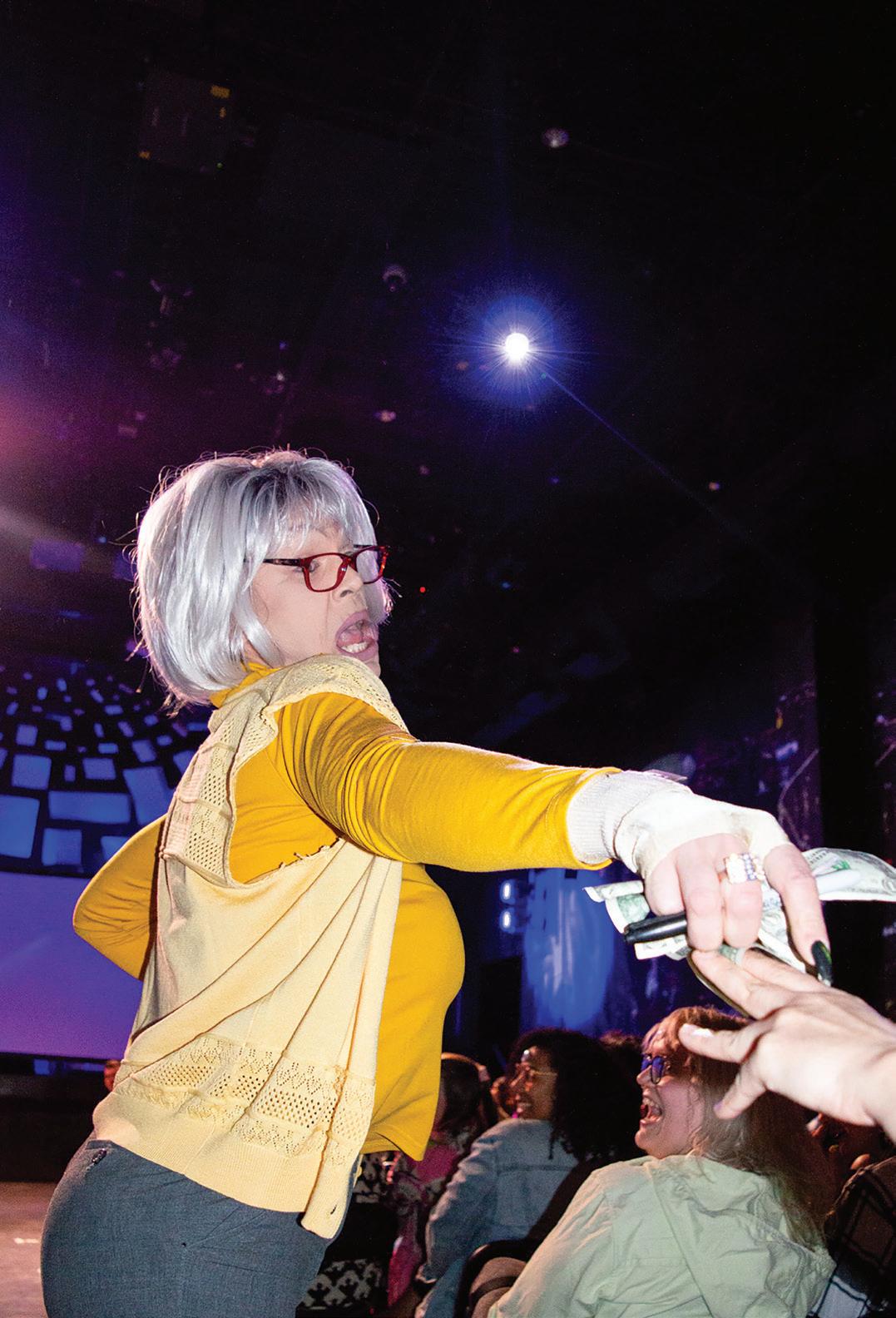
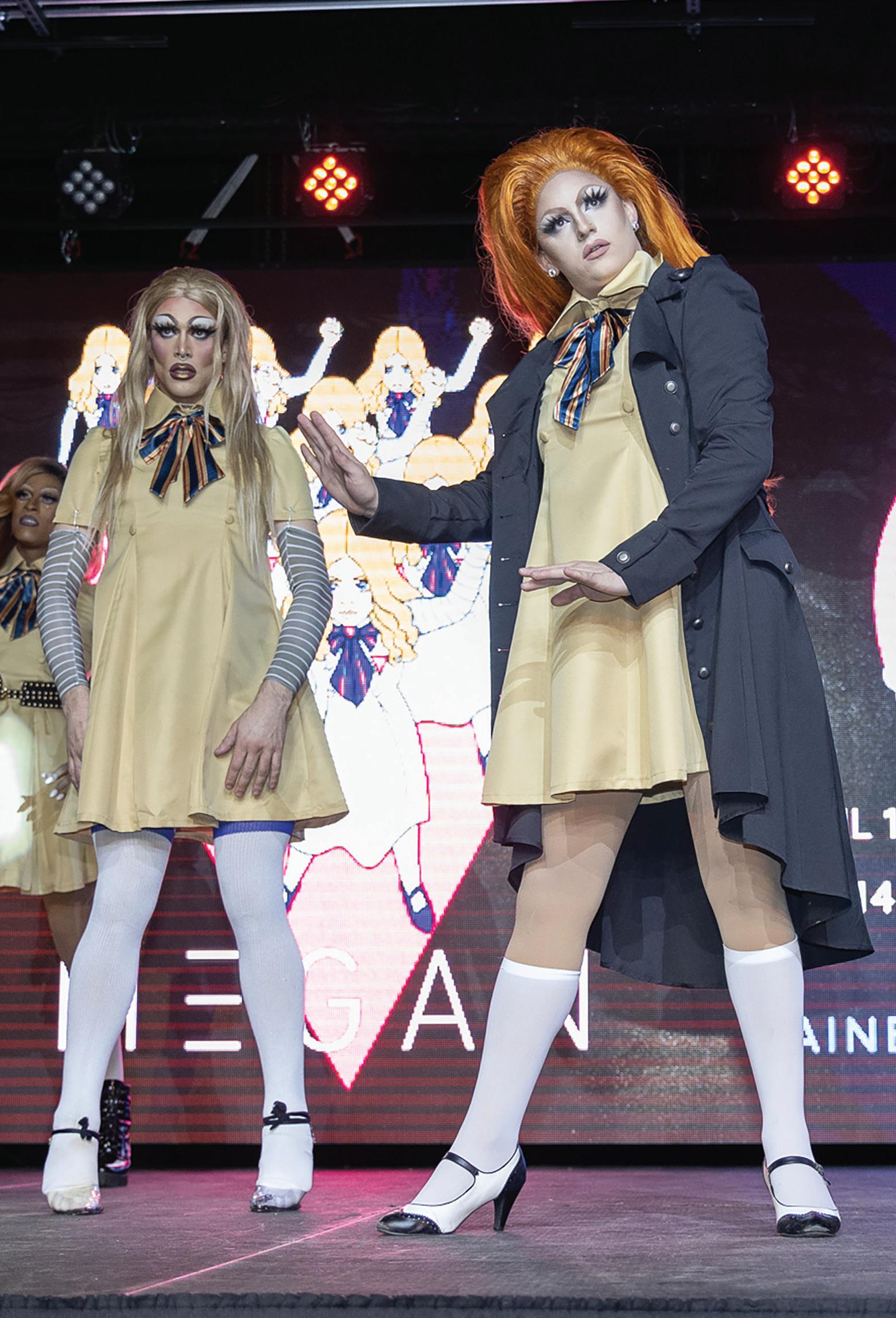



Then it comes back up with the blue screen?’ The day that you're taking ketamine is that screen, and then for three to four days after, we have neurogenesis. So that setup screen, that's when you're literally in that narrative that said, ‘I'm not good enough,’ I can actually call that into question now, and be more curious about it. It's not set in stone anymore,” Bailey explains.
Due to this ability to rework preconceived notions about ourselves, ketamine therapy is incredibly helpful for queer people and people of other minority groups. Trauma is common for people in the queer community, as it comes from “systemic discrimination and oppression. It comes from a lack of freedom and autonomy. It comes from consistent abuse and neglect and violence against communities, and how that trickles down into microaggressions and affects people on a physical, relational, biological, cellular level,” Bailey says. Ketamine therapy can directly tackle this trauma in a much faster and cheaper way than talk therapy, making it much more effective and accessible for queer people.
Usually, the process of ketamine therapy only takes about six to eight months, with a yearly check-up session after the process. At My Denver Therapy, these two-to-three-hour sessions start with an evaluation by a nurse practitioner who scans for anything that might interfere with ketamine therapy such as schizophrenia or active mania in bipolar people. Bailey has people practice journaling in order to become more in touch with their subconscious which helps get the most out of their ketamine sessions.
After a nurse takes their vitals, the patients will set an intention and take their dose of ketamine with an eye shade on as they are guided through a meditation by their therapist. During the meditation, Bailey explained that she often stays quiet and works through the session with
the patient after they come out of it. Then they often work together to break down what the client experienced and what it might mean.
Currently, in clinical trials, MDMA-assisted psychotherapy is being used to treat PTSD. Erin Carpenter, LCSW, an MDMA-trained therapist at Psychadelic Growth in Boulder, described the way MDMA is beneficial in therapy, saying “It down-regulates the fear center in the brain, so it softens those psychological defenses that are there for very good reason, but make it difficult to open up and talk about or experience or process any kind of trauma, so that folks can explore that material, see it in a different light, make connections with that it in a way that is really hard to do with regular talk therapy.”
Chemically, MDMA therapy works by boosting oxytocin and working with serotonin receptors in the brain, which creates a positive and loving introspection that allows people to work through their issues from a more positive perspective than they might be able to in talk therapy alone.
Similarly to ketamine therapy, MDMA therapy could be incredibly beneficial to the queer community specifically as it allows people to work through traumas and mindsets that have been deeply internalized. “MDMA is really, really helpful with bringing to the surface thoughts, feelings, experiences, and patterns of being that have been shoved under the surface. Which a lot of people, queer, minority, or not, sometimes feel like they have to mask or feel some internalized shame based on their life experiences. MDMA can help soften those edges and bring those things up in a way that's more open-minded, loving, accepting. Working with those parts of themselves to see how it can integrate with the rest of their lives,” Carpenter explains.
In terms of how an MDMA therapy process would look, before even taking a dose, there would be several talk thera-
py sessions with a therapist to make sure the client feels safe and trusts their therapist. On dosing day, the session would be around six to eight hours, but would otherwise be similar to the treatment sessions for ketamine, with the patient sitting with an eyeshade and headphones on while the drug is active.
But what’s the difference between these two drugs, and the positive therapeutic experiences they could create? Carpenter explains it beautifully: “Ketamine is a dissociative. It gives you space to look at your issues or your problems from a distance and get new perspectives. MDMA brings you closer to your experience, which can be overwhelming, but it has that downregulation of the fear response and the anxiety response. It kind of amplifies what's already going on, but it can do it in a really safe kind of way.”
For both of these therapies, it is incredibly important to trust your therapist. Make sure that they are certified and that you are safe. These therapies are emerging into the world of wellness, so it is possible that people may not be truthful about their qualifications. If you plan on looking into psychedelic therapies, you should be very aware of this danger and ask your providers about their qualifications and clarify consent.
Lastly, psychedelics often belong to a cultural history, and it is important to approach psychedelic therapies such as MDMA and ketamine therapy with respect and a sense of appreciation for those cultural histories that furthered our understanding of psychedelics.
Bailey encourages those who use ketamine to give back to their communities by volunteering or providing testimonies to the clinics where they did ketamine treatment, continuing the spirit of reciprocity and respect that is characteristic of psychedelics.


ary, and a devout queer film aficionado—Scahill still managed to make time to found the nonprofit Rainbow Cult.

His passion for the power of cinema and its connection to LGBTQ+ folks is clear from the moment you meet him. Scahill can talk about queer theory application to movies for hours, perhaps a reflection of the hours he spends lecturing that “the evil child in horror cinema represents a conservative attempt to unchild certain classes of children.”
Starting amidst the COVID-19 pandemic, Rainbow Cult began as a movie club that welcomed folks to Scahill’s backyard (socially distanced, of course) to celebrate films and queerness along with encouraging friendships in a time that many felt isolated. From this casual, albeit unlikely start, Rainbow Cult now hosts interactive movie events regularly at Meow Wolf.
Scahill says, “Coming out of COVID, I basically did a whole lifestyle change.” Stuck in the toxic ideal of health in the world of gains in the gym, he transitioned his health goals towards yoga and fulfilling his mental health. He embraces his insight that bloomed from meditation, Buddhism, and utilizing medicines that come from the ground to heal his body. All in all, he is finding a healthier version of himself.
In the face of financial shame, mental health challenges, and finding healthier ways to cope, Scahill left the pandemic with a new strength and built a community that has bloomed into the magical experience that is Rainbow Cult.
Scahill says the Rainbow Cult focuses on creating “venue-driven cinema.” Attendees at the Troop Beverly Hills screening were greeted with Girl Scout Cookies, and everyone got bling at the Show Girls viewing. He adds, “Let’s watch Jurassic Park in the Natural History Museum at the dinosaur exhibition. Let's watch Bring it On in a high school auditorium. We did Clue in the Lumber Baron mansion. And for Meow Wolf, I try to pick films that are surreal.”
He adds, “So to be able to get together and revisit these things where it's not like the church experience of cinema—where it's like a lull into passivity. I want us to be boisterous, and people to express themselves and express their love. And then that idea is expanded into queer yoga and these other spaces to create a third space, an alternative kind of social scene. And a place that encourages creativity.”
On its surface, Rainbow Cult is queer mecca that invites guests to view films in a unique way. Digging deeper, Scahill also strives to use the nonprofit to create a sanctuary of artistic expression and emotions:
“Queer artists have always tried to create archives of feelings,” Scahill says, and Rainbow Cult aims to do just that.
He’s been thinking about Rainbow Cult as a space where he can do an ethnographic study and capture the cultural and emotional significance that the nonprofit supplies and audience members enjoy.
He says, “We're trying to do something different here, and these events are something I haven't seen before. I want to embrace a different way to think about cinema here in the 21st century … because I think queer people love these movies, but we haven't been able to watch them all together in the way that our straight colleagues get to do all the time.”
Once his tenure at CU Denver is approved, Scehill plans to use his sabbatical to build Rainbow Cult to larger heights. He even says he hopes to get Elivra to make an appearance in an upcoming event.
You can find more information on Rainbow Cult on their website, or at their upcoming viewing of Labyrinth November 19 at Meow Wolf. This event is almost sold out, but there will also be a special, adults-only showing on November 20.
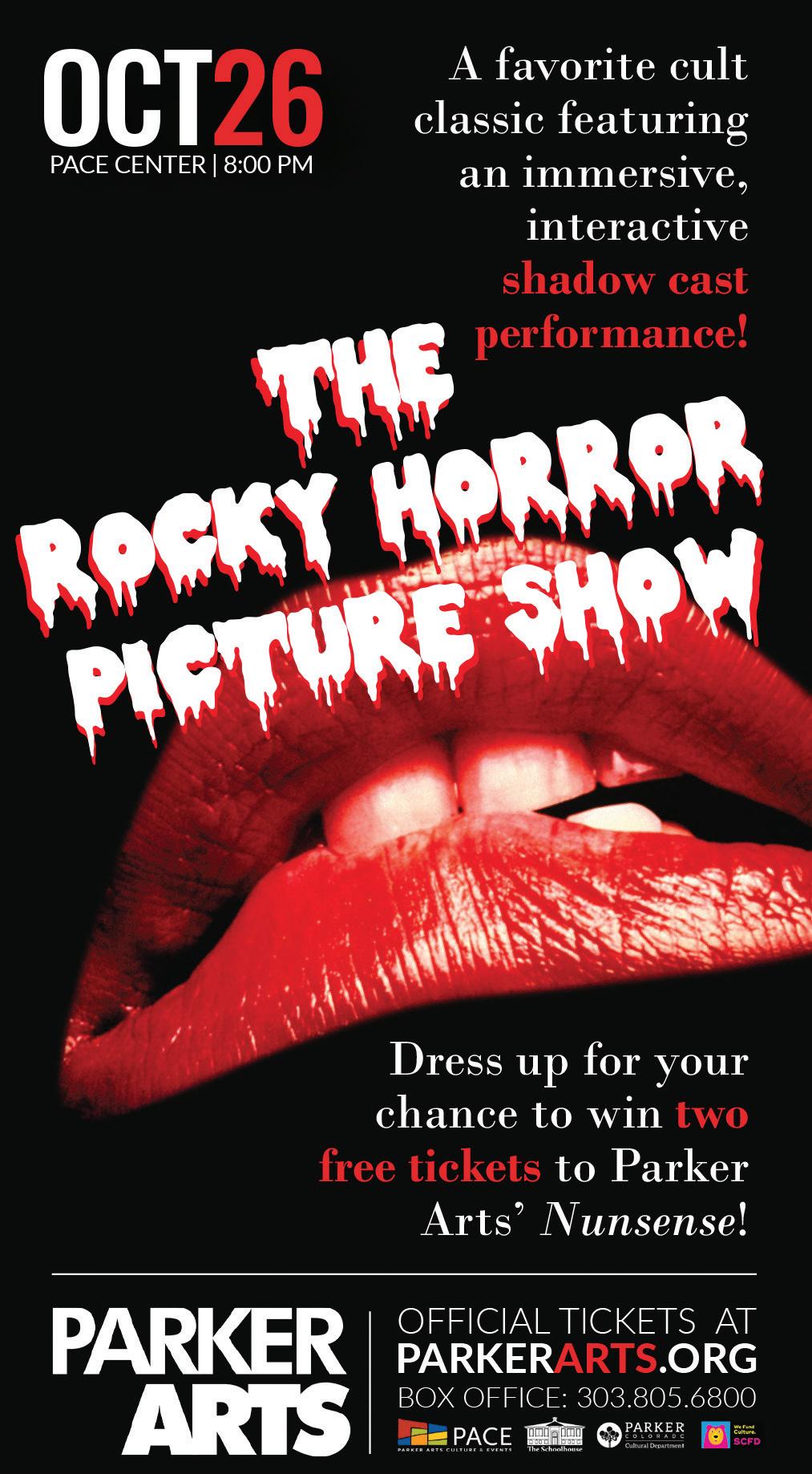
Greetings fellow travelers! While we await a time when we can put full-on psilocybin reviews in these pages, we have the next-best thing! Check out these mushroom and cannabis reviews, and treat yourself to a little mushy or ganja goodness while we all look forward to 2025.
Ripple already had the game on lock with their unique powder formula, but now they have rosin gummies too! Their business model is simple: Keep the packaging as clean and basic as possible to save time and money, but make the gummies delicious and pack a punch. And they totally achieve that. You have to taste it to believe it!
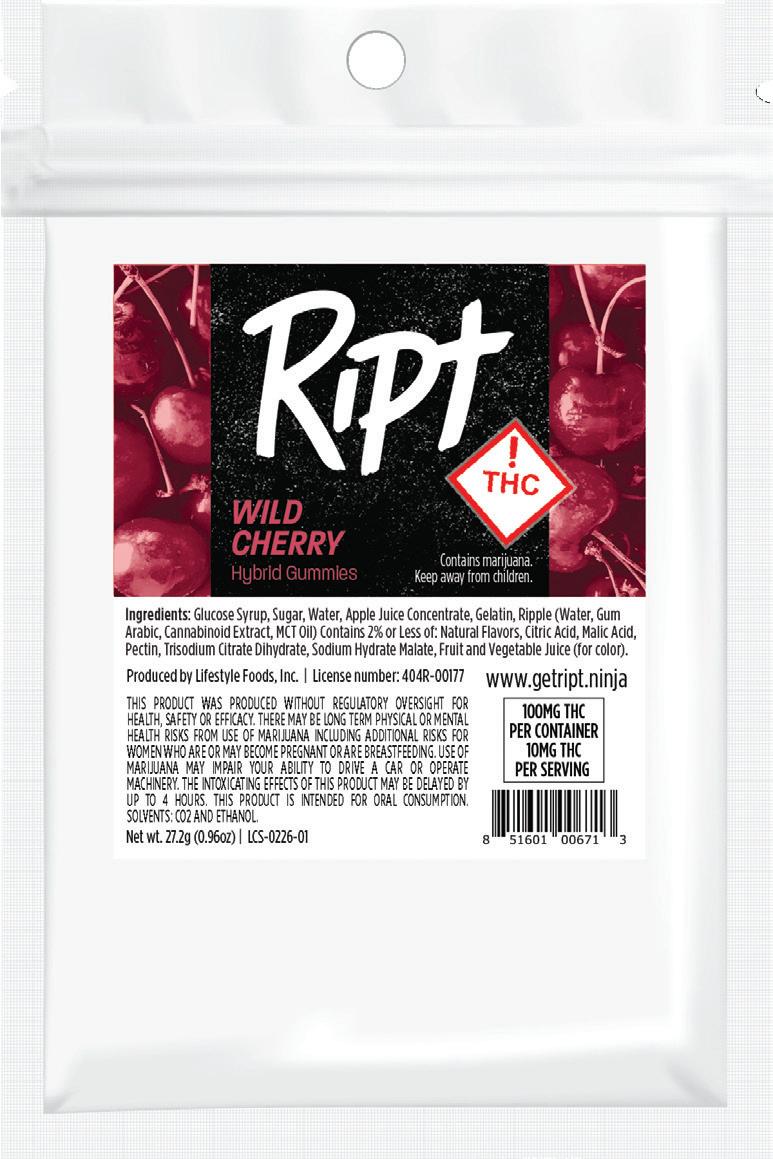
Whether you pep up your food or drink with this spicy infusion or simply pour it on your tongue in a pinch, these fact-acting THC packets are a must-carry. They turn anything into an edible, and the taste is subtle, so if you want to infuse water, a drink, or even a whole meal, you can still totally enjoy your tasty treat and then also feel the effects.

If you love weed and miss Pixie Sticks, you are in luck. Now you can go beyond the gummy, chocolate, or hard candy experience with your edibles and have some flavored powder candy! This tasty treat is discrete and perfect for on-the-go dosing, and you’ll feel like a kid again, but with the head buzz of a very toasty adult.

If you want a hookah-style smoking device that hits like a champ, the Tyson/ Stündenglass collab will definitely deliver the KO. With a cool boxing glove-shaped dome and state-of-the-art technology, with this one device, you’ll be set with all your flower needs. This fancy rig is worth the price!
Not everyone is into spicing up their food or treating themselves to an edible. Some folks would just like to pop a pill and feel the effects of cannabis. Ripple has you covered there as well with their small, discrete, and flavorless cannabis tabs. Pop one and see what all the fuss is about!

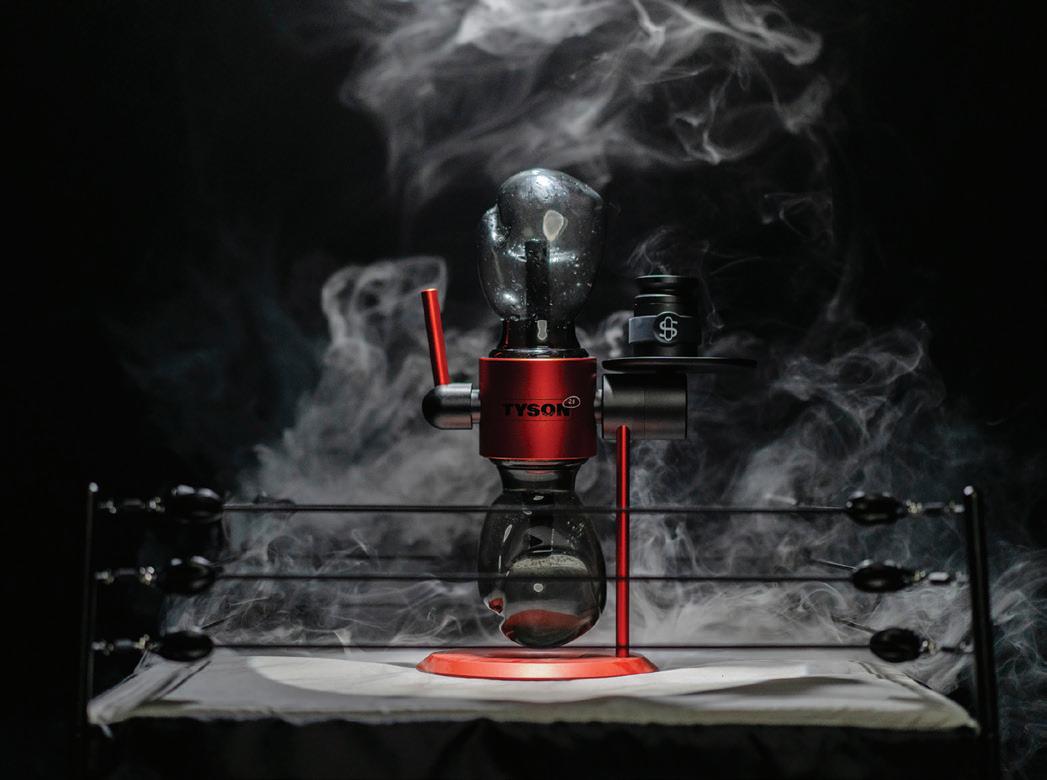
No, we can’t review psilocybin chocolates for you yet, but while your anticipation is building, curb your cravings with this tasty chocolate bar full of all the functional mushroom goodness you need to be happy and healthy. The packaging is gorgeous too, and you’re shopping small when you get a Mycoday chocolate bar.
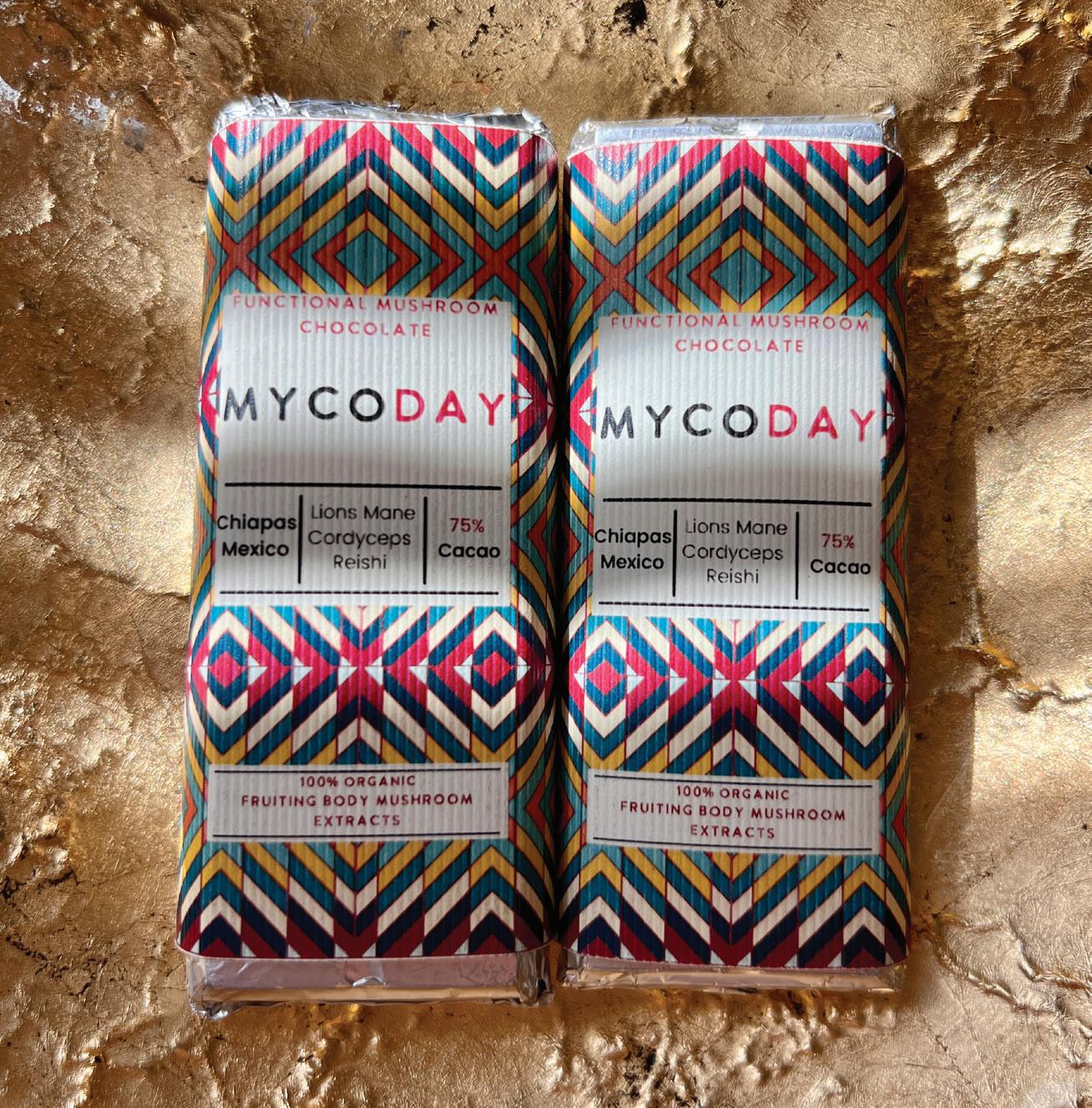
If you’re looking to spice things up in the bedroom, Lavinia has you covered with their tasty watermelon gummies. They even make a special After Sex gummy because after-care is key. It’ll help you fall into a restful sleep after getting nasty. Lavinia prides itself on natural ingredients, but unlike some gummies that prop themselves up as all-natural, they still taste like candy and are super delicious as well.

These tasty edibles come in a fun, colorful bag and are discrete and delicious. Don’t miss out on the yummy goodness of these flavorful edibles, and at 10 mg each, they’re the perfect way to perk up before you go out without getting couchlock. Don’t sleep on these!

You’ll be bouncing with the new THC and caffeine energy drink from Big Freedia. Yes, the bounce star herself has released a super queer and super tasty energy drink, and we can’t get enough. Try one before you hit your next club or drag show, and always consume responsibly!
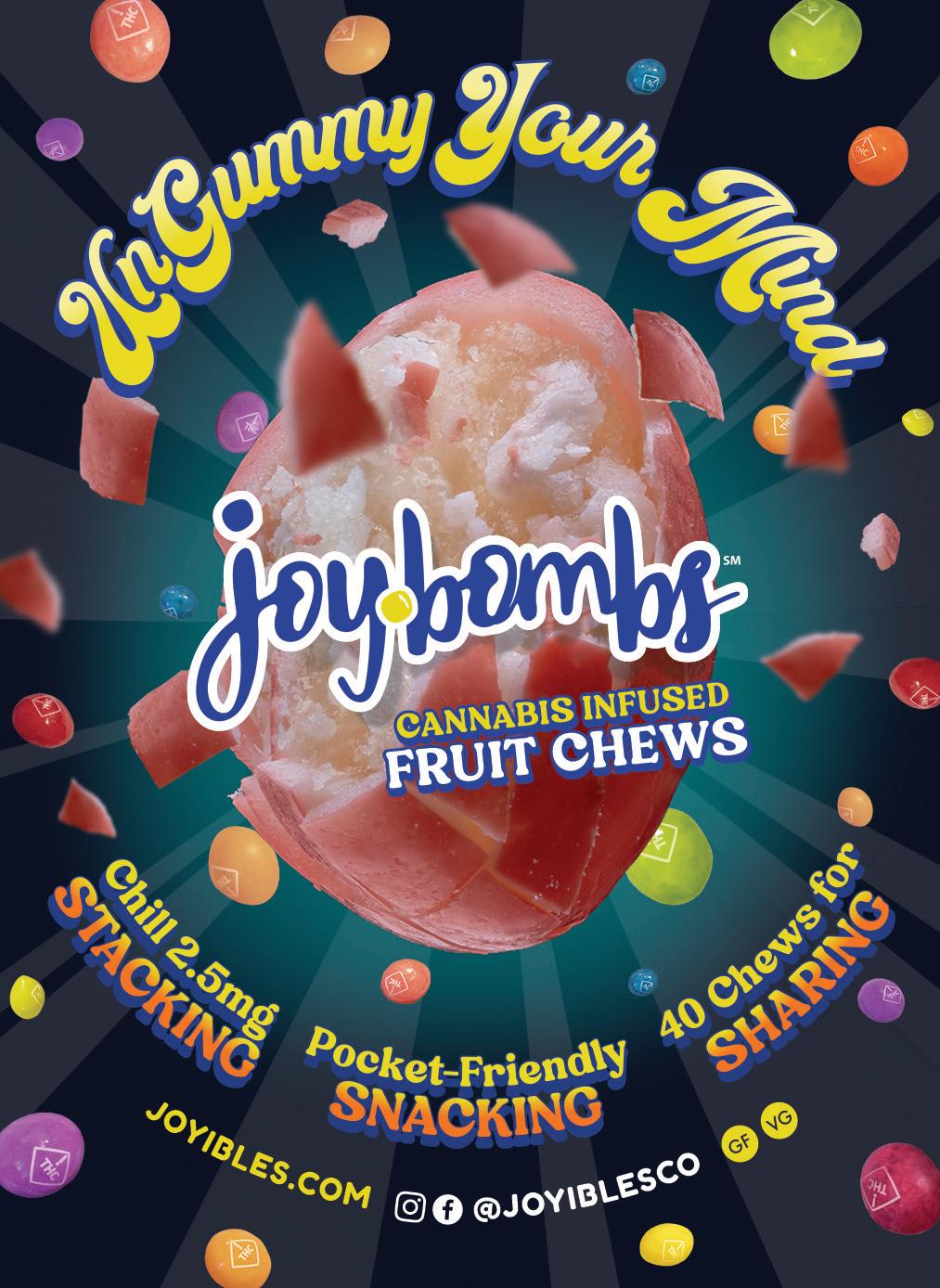
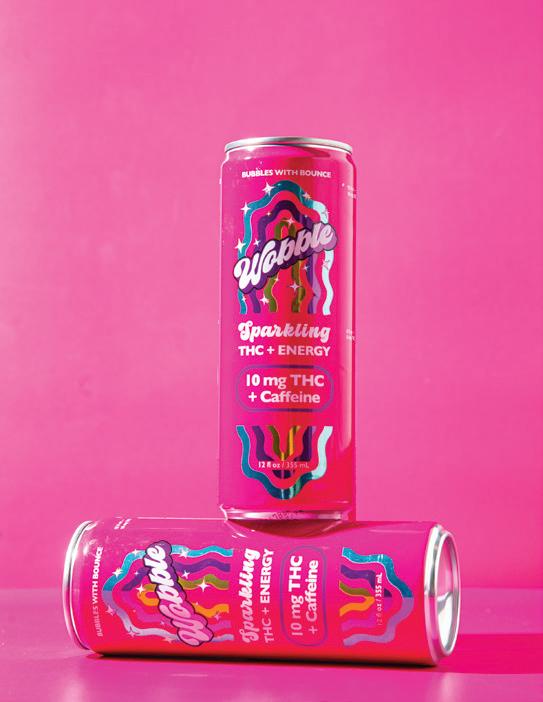
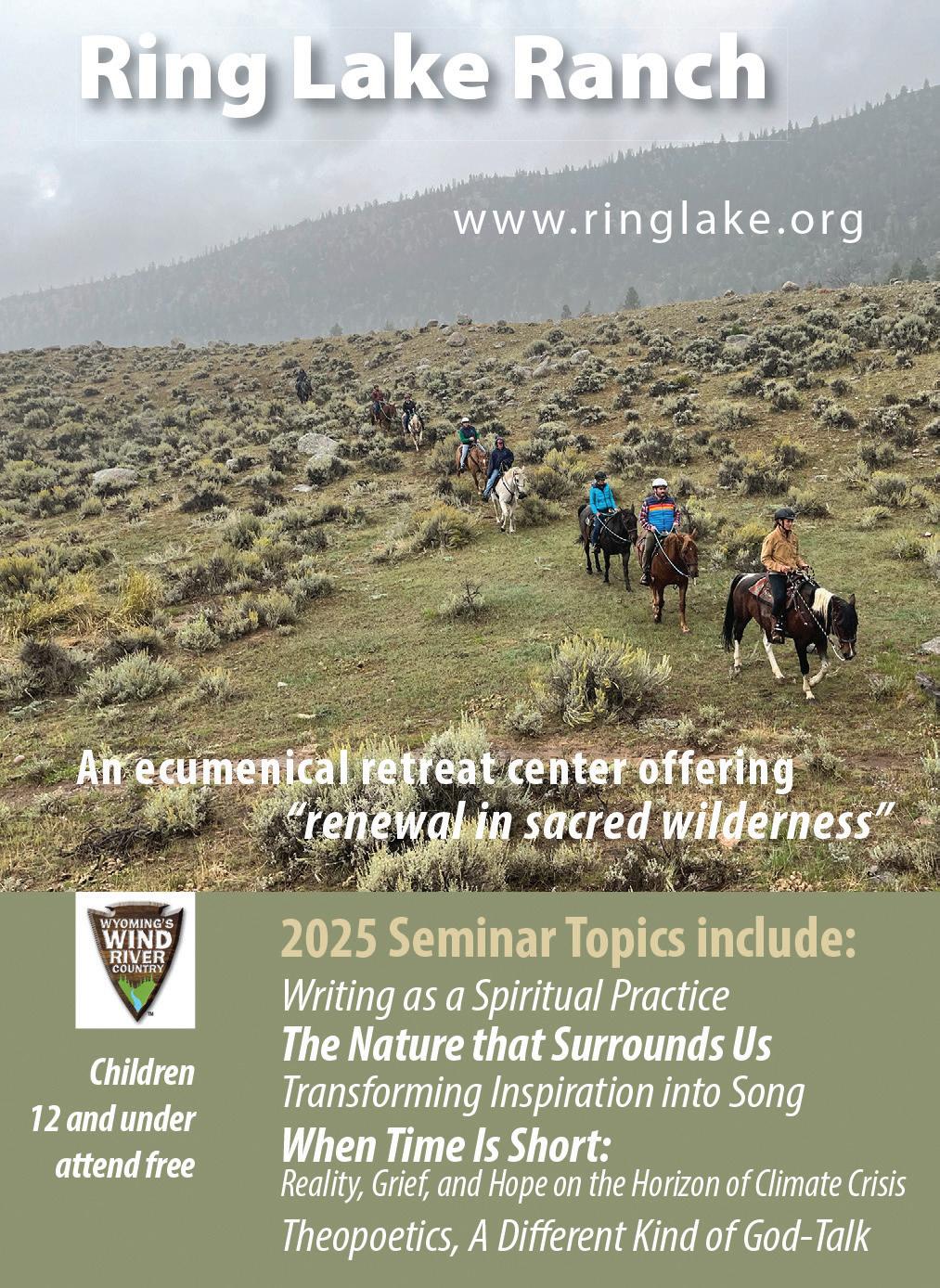
Hometown Hero makes tasty gummies in a classic package, and we can’t wait for you to
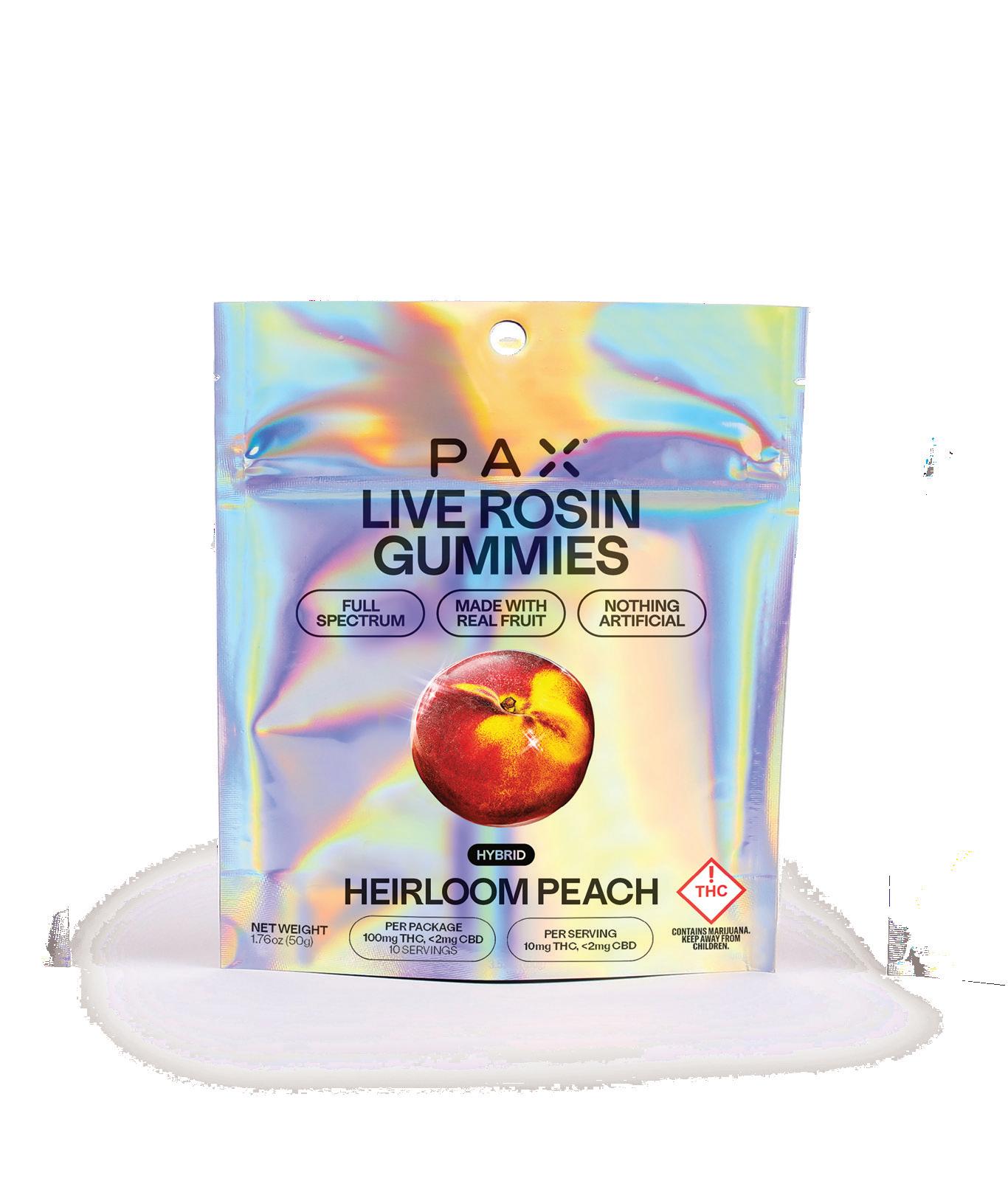
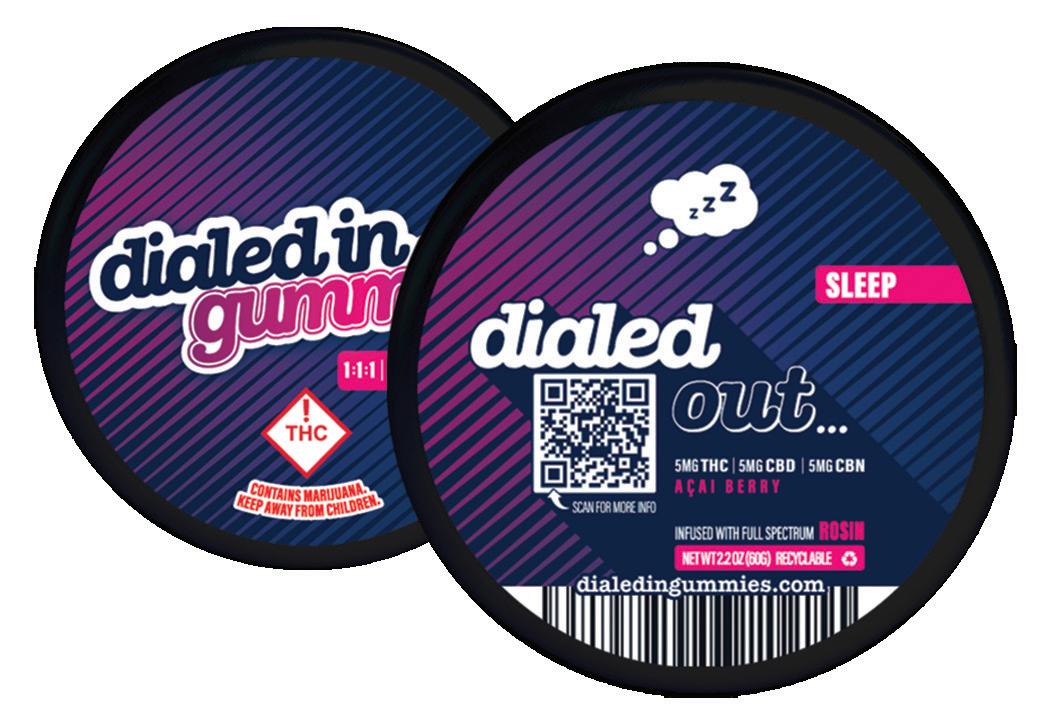

Finally, PAX has live rosin gummies too! Their carts have been rocking our world for years now, so this is a welcome addition. And with summery flavors like peach and mango, they are refreshing and really tasty as well as powerful and well-made edibles. Definitely check these out!
We’re already huge fans of Dialed In, some of the best rosin gummies out there for when you want to catch a buzz. But when you just want to go to sleep, try their special Dialed Out formula. Just liked the Dialed In gummies, these hit quickly, and they’re very effective. Plus, they are lower in THC, so you won’t feel like you’re “wasting” your high by going to bed.
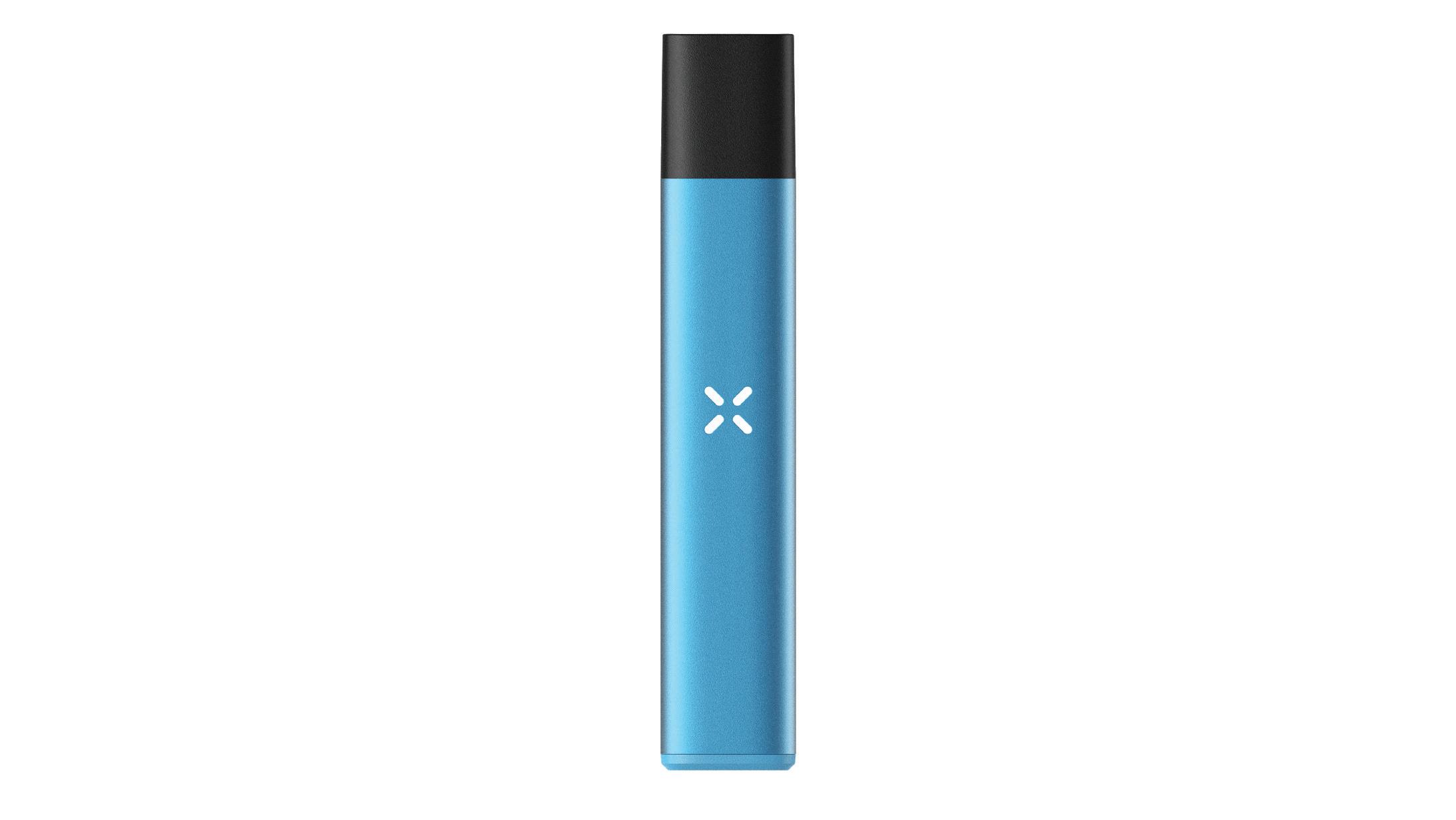
Denver Spore Company
Eric Burden
720-400-6396 | Denversporecompany@gmail.com denversporecompany.com
Experience the magic of growing your own mushrooms with help from our customer service, tutorials, FAQ, and microdosing info.
ENB Supply
Eric Sturm
720-618-9399 | enbsupply.com
ENB Supply collaborates with local suppliers to offer top-quality mushroom supplies. Making mycology available to the masses.
Psychedelic Club of Denver
Amber Kirschbaum
amber@pcodenver.compcodenver.com/cup
We are a grassroots nonprofit dedicated to harm reduction, education, and community building surrounding psychedelics and other substances.
Radiant Resurgence Retreat
Felicia Mendes
720-227-5081 | Felicia@radiantresurgenceretreat.com
Radiant Resurgence offers guided mushroom journeys in a safe and supportive environment designed to empower and build community.

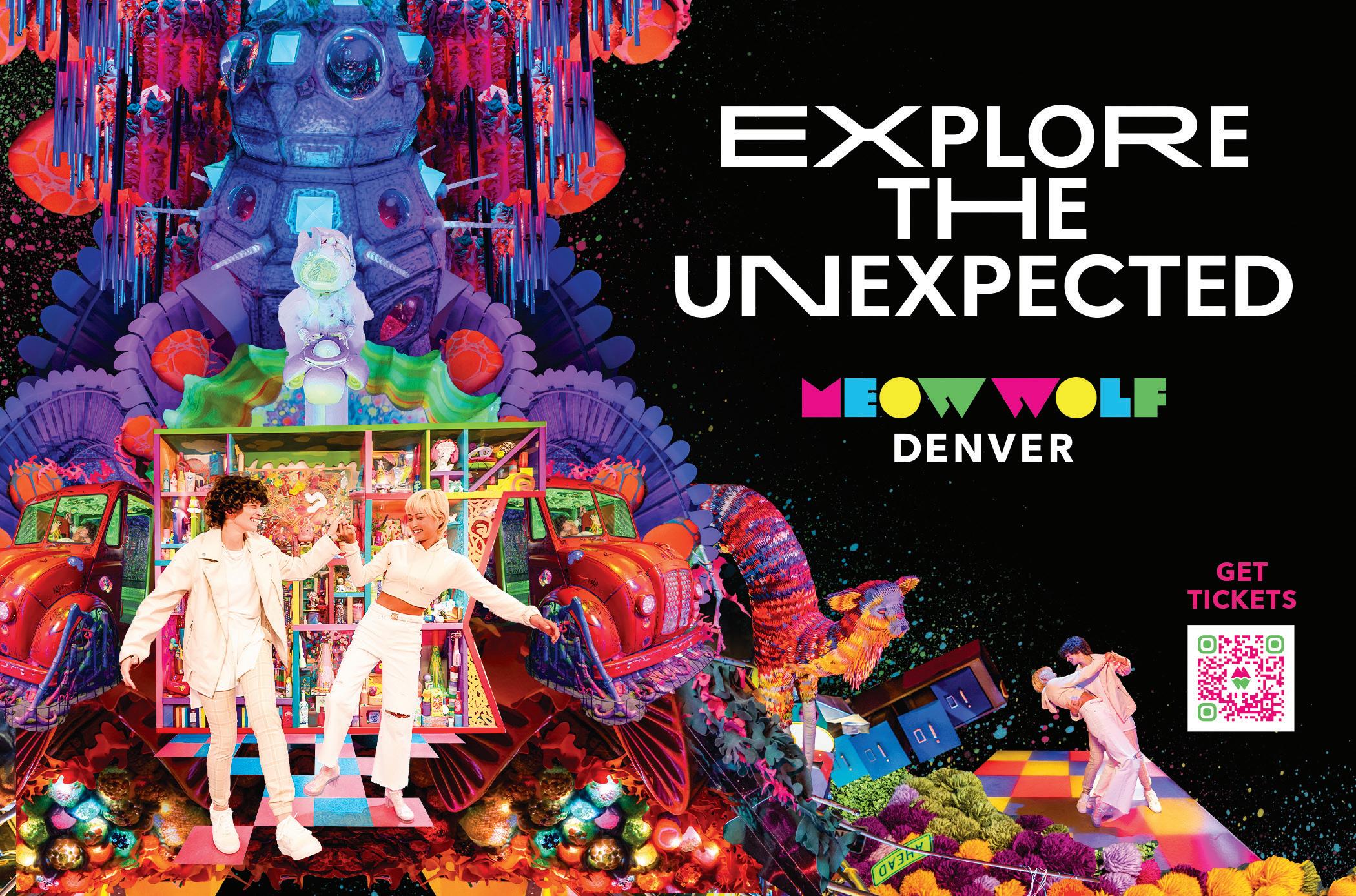
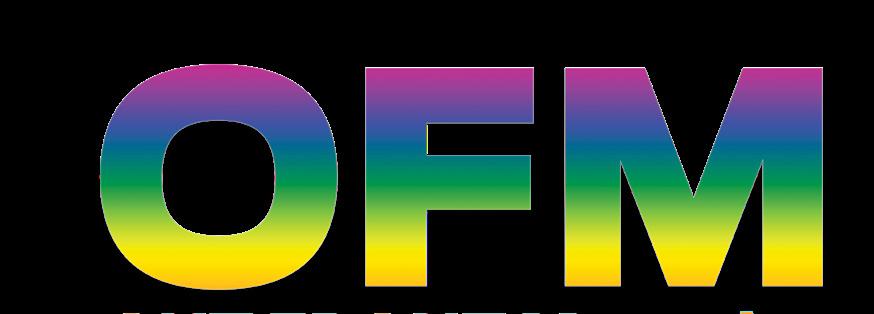
BAD HABITS DENVER
3014 E Colfax Ave. Denver (303) 335-9690 badhabitsdenver.com
BLUSH & BLU
1526 E. Colfax Ave. Denver (303) 484-8548 blushbludenver.com
BOYZTOWN
117 Broadway St. Denver (303) 722-7373 boyztowndenver.com
CLUB Q
3430 N Academy Blvd. Colo Springs (719) 570-1429 clubqonline.com
CHAMPAGNE TIGER
601 E. Colfax Ave. champagnetiger.com
CHARLIE’S NIGHTCLUB
900 E. Colfax Ave. Denver (303) 839-8890 charliesdenver.com
DENVER EAGLE
5110 W. Colfax Ave. Denver (303) 534-0500
Facebook @denvereaglebar
EL POTRERO
4501 E. Virginia Ave. Glendale (303) 388-8889 Facebook @elpotreroclub
GOOD JUDY’S
BAR & CLUB
103 N. 1st St. Grand Junction (970) 433-7115 www.good-judys.com
HAMBURGER MARY’S
1336 E. 17th Ave. Denver (303) 993-5812 hamburgermarys.com/denver
LADY JUSTICE BREWING
3242 S Acoma St. Englewood (303) 578-8226 ladyjusticebrewing.com
LIL' DEVILS
255 S. Broadway St. Denver (303) 733-1156 Facebook @lildevilslounge
R&R LOUNGE
4958 E. Colfax Ave. Denver (303) 320-9337
Facebook @randrdenver
TIGHT END BAR
1501 E. Colfax Ave. Denver (303) 861-9103 tightendbar.com
TOWN HALL
COLLABORATIVE
525 Santa Fe Dr. Denver (720) 389-7502 townhallcollaborative.com
TRACKS
3500 Walnut St. Denver (303) 836-7326 tracksdenver.com
TRADE
475 Santa Fe Dr. Denver (720) 627-5905 Facebook @tradedenver
WILD CORGI PUB
1223 E. 13th Ave. Denver (303) 832-7636 wildcorgipub.com
X BAR
829 E. Colfax Ave. Denver (303) 832-2687 xbardenver.com
#VYBE
1027 N. Broadway St. Denver (720) 573-8886 303vybe.com

DENVER SWEET
776 N. Lincoln St. Denver (720) 598-5648 denversweet.com
TUE: Solve That Puzzle or Music Bingo 7 pm w/Taco Tuesday, $3 Modelo, $5 House Margs
WED: Trivia with Alejandro 7 pm-9 pm w/$5 U Call It At The Bar, $.75 Wings
THU: Karaoke 8 pm w/BOGO Well & Drafts 2 pm to 8 pm, $5 Sliders
FRI: Sinna-G Happy Hour 5p to 9p Drag Race & Star Lite Show 6p-10p w/Happy Hour 2p-8p, 1/2 price flatbreads
SAT: Rooftop T 5 pm-9 pm w/Happy Hour, $5 Off Burgers
SUN: Loteria Brunch 11am Charity Beer Bust 4p-8p $12/cup Bud Light & Truly Hard Seltzer


